DOWNLOAD NEWS 2013/11
Brian Wilson
Download News 2013/10 is here;
2013/9, with reviews of recent Beulah releases is here
2013/8 here
and the Index of earlier editions is here.
Don't overlook David Barker's very useful article
on collecting in the digital era.
Thomas TALLIS (c1505-1585)
Salve intemerata and other sacred music
O Lord, give thy Holy Spirit [2:58]
Missa Salve intemerata [21:03]
Man blest no doubt (No.1 of Nine Psalm Tunes) [3:41]
I call and cry to thee [3:42]
If ye love me [2:24]
Domine, quis habitabit? [8:15]
A new commandment [2:58]
Alleluia. Ora pro nobis [4:00]
Let God arise (No.2 of 9 Psalm Tunes) [3:35]
Salve intemerata virgo [16:06]
The Cardinall’s Musick/Andrew Carwood
Pdf booklet included
HYPERION CDA67994 [68:42] – from
hyperion-records.co.uk (mp3, 16– and 24-bit lossless) (September
2013 release)
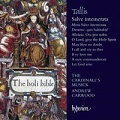 This
is the second instalment of The Cardinall’s Musick’s traversal of the
music of Tallis, following the earlier Gaude gloriosa and other sacred
music on CDA67548 – review
and June
2011/1 DL Roundup. If that seems like a long gap, the interim has
not been mis-spent; their complete traversal of Byrd’s Latin music,
begun on ASV and completed by Hyperion, was followed in 2012 by his
Great Service and other English music (CDA67937
– 2012/19
DL News).
This
is the second instalment of The Cardinall’s Musick’s traversal of the
music of Tallis, following the earlier Gaude gloriosa and other sacred
music on CDA67548 – review
and June
2011/1 DL Roundup. If that seems like a long gap, the interim has
not been mis-spent; their complete traversal of Byrd’s Latin music,
begun on ASV and completed by Hyperion, was followed in 2012 by his
Great Service and other English music (CDA67937
– 2012/19
DL News).
The first volume of their Tallis ended up most unjustly in the unloved
‘Please buy me’ category; I very much hope that Volume 2 will sell better,
though there is very strong competition from the complete set of recordings
(La Chapelle du Roi, Brilliant Classics), also available separately,
on Signum and the various recordings made by the eponymous Tallis Scholars
(Gimell).
The new recording intersperses settings in Latin and English and though,
inevitably, the English-texted music, especially the two works from
Archbishop Parker’s Psalter, sounds sparse by comparison – it was Tallis’s
friend Byrd who first successfully married the polyphonic style to English
words – these performances prove that it should not be written off.
O Lord give Thy Holy Spirit, which opens proceedings, is a notable
case in point – aptly described in the notes as ‘exquisite’.
I’m not even going to try to compare the performances with those on
Brilliant and Signum and, where relevant the Gimell. All three are so
good that I can only urge you to obtain at least some of each – if you
can’t run to the complete set from La Chappelle du Roi, though that’s
inexpensive at around £25 for 10 CDs and can be downloaded from
amazon.co.uk
for a mere £7.49, at least opt for the selection on Regis RRC1394,
Spem in alium, Lamentations I and II and motets for around
£5. The more extensive 2-CD Regis/Portrait release which I recommended
some time ago is apparently deleted, though amazon.co.uk had one left
when I checked.
One minuscule niggle concerning Andrew Carwood’s excellent notes: the
Book of Common Prayer as restored in 1559 was not the first Edwardine
Book of 1549 but the more Protestant revision of 1552, albeit with some
small restorations from 1549 which apparently reflected Queen Elizabeth’s
belief in the Eucharistic Real Presence. Whatever her personal preferences
might otherwise have been, the return of so many exiles from Geneva
and the refusal to serve of even the most moderate bishops from Mary’s
reign limited her choices – her Archbishop of Canterbury, Matthew Parker,
found it impossible to force all clergy to wear a cope and had to be
satisfied with insisting on the retention of the surplice against Puritan
opposition.
Times go by Turns
William BYRD (1540-1623) Mass for four voices [21:40]
Richard Rodney BENNETT (1936-2012) A colloquy with God [3:36]
John PLUMMER (1410-1483) Missa sine nomine [25:54]
Andrew SMITH (b.1970) Kyrie cunctipotens Genitor Deus [3:44]
Thomas TALLIS (1505-1585) Mass for four voices [19:39]
Gabriel JACKSON (b.1962) Ite missa est [2:32]
New York Polyphony (Geoffrey Williams (counter-tenor), Steven Caldicott
Wilson (tenor), Christopher Dylan Herbert (baritone), Craig Phillips
(bass)) – rec. January 2013. DDD
Pdf booklet with texts and translations included
BIS BIS-SACD-2037 [77:58] – from eclassical.com
(mp3, 16– and 24-bit lossless)
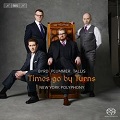 This
is something of a mixed blessing. The plus points include the alternation
of music from the heyday of polyphony with modern compositions, reminding
us of the continuity of music through the turmoil of the Reformation
and until the present day, with the three modern works showing clearly
their kinship with their three predecessors. Andrew Smith’s Kyrie
cunctipotens Creator Deus even uses as its text a troped or farced
Kyrie such as is found in the Sarum Missal, with extra words
interpolated to accommodate ever more elaborate settings, as here in
the Plummer Mass, a practice which Archbishop Cranmer sought to end
in 1549 with his rule of one note per syllable as far as possible.
This
is something of a mixed blessing. The plus points include the alternation
of music from the heyday of polyphony with modern compositions, reminding
us of the continuity of music through the turmoil of the Reformation
and until the present day, with the three modern works showing clearly
their kinship with their three predecessors. Andrew Smith’s Kyrie
cunctipotens Creator Deus even uses as its text a troped or farced
Kyrie such as is found in the Sarum Missal, with extra words
interpolated to accommodate ever more elaborate settings, as here in
the Plummer Mass, a practice which Archbishop Cranmer sought to end
in 1549 with his rule of one note per syllable as far as possible.
Actually, the Byrd Mass meets that demand pretty well – a simpler setting
had also become a requirement for the Latin rite after the Council of
Trent – and could easily have been sung in the Queen’s Chapel Royal,
where Latin texts and elaborate vestments and ritual still found a home,
but it was almost certainly intended for small-scale private celebration
in the home of Roman Catholic sympathisers in deepest Essex.
That brings me to the minus side: I thought that the Byrd Mass which
opens the proceedings was delivered in somewhat too forthright a manner
for a work which would have been sung with a degree of circumspection
in the home of his recusant benefactor. The manner here, with the intonation
of the opening Kyrie sung as if in defiance of Puritan spies,
would be more suited to a performance of his Great Service, intended
for public Anglican worship in the Chapel Royal or Westminster Abbey.
I have to admit, however, that I listened again immediately after hearing
the whole CD and liked the performance a whole lot better the second
time. Though the Tallis Mass moves a good deal faster than on other
recordings, New York Polyphony’s tempi for the Byrd are fairly leisurely
– very similar to those adopted by the Tallis Scholars on their classic
recording of all three Byrd Masses (CDGIM208, two-for-one, with
the Great Service, etc. – review
and January
2009 DL Roundup). If you prefer the music in the context of an actual
service, in the case of the four-part work with music for Corpus Christi,
Nimbus can provide that with their three recordings from Christ Church,
Oxford – review.
Those recordings of the three Byrd Masses are also available, without
the additional music, on a bargain release for around £5 (Regis
RRC1336: Bargain of the Month – review).
This is hotly contested territory and I would still prefer any of the
above to the new recording, but there are other considerations. The
sections of the 4-part Mass are also distributed across 1605: Treason
and Dischord (Signum – see list below).
Historians and students of literature have only recently begun to challenge
the Tudor myth that the fifteenth century was dismal and unproductive
– even the great C.S. Lewis called it ‘long’ and by implication boring
– but musicologists have long known that it was a great age of English
polyphony. NY Polyphony would have done us a favour in making available
this performance of John Plummer’s Mass were it not that we already
had a fine performance from the Clerks’ Group on Signum, together with
another work from the same Brussels MS, Frye’s Missa Flora Regalis
(SIGCD015 – June
2009 DL Roundup). As it is, the forthright New York style is more
suited to this work than to the Byrd Mass. Autre temps, autre mœurs
indeed or, as the title of this CD has it, quoting the martyr Robert
Southwell, Times go by turns; it’s unfortunate that the performing
style of the Byrd doesn’t illustrate that maxim more accurately. I liked
the Clerks’ performance of this work, but my colleague Peter Wells was
less impressed for reasons which I don’t fully understand – review
– so it may well be that he and others would prefer the new recording.
It’s far from clear when the Tallis Mass was composed – Chapelle du
Roi in their complete series include it ambiguously in the Music
at the Reformation disc (Signum SIGCD002). As the notes in
the booklet point out, it makes sparing but effective use of polyphony,
so could have been composed at any time from late in the reign of Henry
VIII onwards. It may be that my ear had become more attuned to the NY
Polyphony style by this point, but I enjoyed their performance of this
work, though I marginally prefer the rather more leisurely singing on
the Signum recording. Indeed, that whole Signum series remains my benchmark
for the music of Tallis. There are also very good versions of this four-part
Mass on Naxos (Oxford Camerata Naxos 8.550576 or 8.556842)
and from Magnificat (Linn CKD233 – August
2009 DL Roundup).
Gabriel Jackson’s Ite missa est is one of those works which sounds
both ancient and modern – think of some of the 20th-century settings
of medieval carols, familiar from King’s on Christmas Eve and you are
in the right area. The style of the New York singers comes fully into
its own here.
The recording is good, though the rather close balance heightens the
forthrightness which I disliked in Byrd. I tried both the 24-bit and
the mp3 downloads. The notes are scholarly but comprehensible even to
non-scholars. The rather improbable timings listed on the eclassical.com
page – 41:32 each for the Byrd and Tallis – are somewhat wide of the
mark.
Some other recommendations of music from this period from eclassical.com:
• William BYRD and Thomas TALLIS: Heavenly Harmonies,
Stile Antico, Harmonia Mundi HMU807463 [78:38] – from eclassical.com
(mp3 and lossless). Recording of the Month – details and
review
• Puer natus est – Tudor Music for Advent and Christmas,
Stile Antico, Harmonia Mundi HMU807517 [78:01] – from eclassical.com
(mp3 and lossless, with pdf booklet). Recording of the Month – review
• Passion and Resurrection – Music for Holy Week, Stile
Antico, Harmonia Mundi HMU807555 [71:08] – from eclassical.com
(mp3, 16– and 24-bit lossless, with pdf booklet). Recording
of the Month – review
– and 2013/4
DL News.
• Tune thy Musicke to thy Heart: Tudor and Jacobean Music
for Private Devotion, Stile Antico and Fretwork, Harmonia Mundi HMU857554
[66:42] – from eclassical.com
(mp3 and lossless, with pdf booklet) – review
and June
2012/2 DL Roundup.
• Christopher GIBBONS Motets, Anthems, Fantasias and Voluntaries,
Academy of Ancient Music/Richard Egarr, Harmonia Mundi HMU807551
[62:17] – from
eclassical.com (mp3, 16– and 24-bit lossless, with pdf booklet).
Recording of the Month – review.
• Thomas TALLIS, William BYRD, Robert WHYTE, Hugh ASTON
and John SHEPPARD Music for Compline, Stile Antico, Harmonia
Mundi HMU807419 [74:25] – from eclassical.com
(mp3 and lossless, with pdf booklet).See review of Calliope CAL9623
- July
2012/2 DL Roundup.
• Thomas TALLIS Lamentations I and II, Motets and String
Music, Theatre of Voices, The King’s Noyse/Paul Hillier, Harmonia Mundi
HMU907154 [70:39] – from eclassical.com
(mp3 and lossless). See review
of SIGCD016.
• 1605: Treason and Dischord: William Byrd and the Gunpowder
Plot, The King’s Singers, Concordia, Signum SIGCD061 [69:22]
– from eclassical.com
(mp3 and lossless, with pdf flyer) – details and review
and July
2012/2 DL Roundup
• Thomas TALLIS and William BYRD Cantiones Sacræ
(1575) Alamire/David Skinner, Obsidian OBSID-CD706 [2CDs: 2:09:48]
– from eclassical.com
(mp3 and lossless). Recording of the Month - review
and March 2011/1 DL Roundup
• William BYRD Ave verum corpus and other motets
and anthems, Cambridge Singers/John Rutter, Collegium CSCD507
[69:26] – from eclassical.com
(mp3 and lossless) – details and review.
• Thomas TALLIS Complete Works, Chapelle du Roi/Alistair
Dixon: Volume 1 SIGCD001 [71:51] – from eclassical.com
(mp3 and lossless, with pdf booklet); Volume 3 SIGCD003 [64:37]–
from eclassical.com
(mp3 and lossless); Volume 7 SIGCD029 [62:41]– from eclassical.com
(mp3 and lossless). See July
2012/2 DL Roundup.
The above are also available from classicsonline.com in mp3 only but
eclassical.com’s prices are competitive and 16-bit lossless comes at
the same price as mp3, with 24-bit, where indicated, a little more expensive.
Classicsonline.com have the remaining volumes of the 10-CD Signum Tallis
set.
Cipriano de RORE (c1515/16-1565) Missa Doulce mémoire
and Missa a note negre
Missa Doulce mémoire [27:42]
O altitudo divitiarum [7:09]
Fratres: Scitote [5:58]
Illuxit nunc sacra dies [2:25]
Missa a note negre [31:14]
The Brabant Ensemble/Stephen Rice – rec. August 2012. DDD.
Pdf booklet included
HYPERION CDA67913 [74:28] – from hyperion-records.co.uk
(mp3, 16– and 24-bit lossless)
 This
is a valuable addition to the discography of a still under-represented
composer whose secular works are much better known than his sacred music.
Wisely and, presumably, deliberately, this new recording is complementary
to The Tallis Scholars’ recording of the music of Cipriano de Rore (Missa
Præter rerum seriem, with motets and music by Josquin Despres,
Gimell CDGIM029 – Tallis
Scholars at 30 Roundup – or on an inexpensive 2-for-1 collection
of music by Flemish Masters, CDGIM211: Bargain of the Month
– review),
hitherto the most important recording of his religious music, or a collection
of his music from the Huelgas Ensemble and Paul van Nevel on Harmonia
Mundi – the same Mass as on Gimell with a number of madrigals and motets:
out of stock at some dealers and possibly due for reissue at mid price.
Compared with the Gimell in Tallis
Scholars at 30 Roundup.
This
is a valuable addition to the discography of a still under-represented
composer whose secular works are much better known than his sacred music.
Wisely and, presumably, deliberately, this new recording is complementary
to The Tallis Scholars’ recording of the music of Cipriano de Rore (Missa
Præter rerum seriem, with motets and music by Josquin Despres,
Gimell CDGIM029 – Tallis
Scholars at 30 Roundup – or on an inexpensive 2-for-1 collection
of music by Flemish Masters, CDGIM211: Bargain of the Month
– review),
hitherto the most important recording of his religious music, or a collection
of his music from the Huelgas Ensemble and Paul van Nevel on Harmonia
Mundi – the same Mass as on Gimell with a number of madrigals and motets:
out of stock at some dealers and possibly due for reissue at mid price.
Compared with the Gimell in Tallis
Scholars at 30 Roundup.
I see that the Brabant Ensemble are due to sing the Missa Doulce
mémoire and other motets by de Rore at morning Mass in Basel
Münster on 25 August 2013. The quality of these performances makes
me sorry that I shan’t be able to be there to hear them in the flesh;
go if you can, then order the CD or purchase the download. Recording
and booklet are both well up to Hyperion’s usual standard.
Like the Cardinall’s Musick, the Brabant Ensemble already have a distinguished
Hyperion back catalogue:
• Clemens non Papa: Requiem and Penitential Motets
CDA67848
• Crecquillon: Missa Mort m’a privé and other
sacred music CDA67596
• Gombert: Tribulatio et angustia CDA67614
• Lassus: Prophetiae Sibyllarum and Missa Amor
ecco colei CDA67887
• Manchicourt: Missa Cuidez vous que Dieu and other
sacred music CDA67604
• Morales: Magnificat, Motets and Lamentations CDA67694
• Moulu: Missa Alma redemptoris and Missus est
Gabriel CDA67761
• Mouton: Missa Tu es Petrus and other works CDA67933
• Music from the Chirk Castle Part-Books CDA67695
• Palestrina: Missa Ad cœnam Agni and Eastertide
motets CDA67978
• Phinot: Missa Si bona suscepimus and other sacred
music CDA67696
François COUPERIN (1668-1733)
Le Parnasse ou L’Apothéose de Corelli: Grande Sonade, en Trio
[13:54]
Concert Instrumental sous le Titre d’Apothéose composé
à la mémoire immortelle de l’incomparable Monsieur de
Lulli [31:50]
La Paix du Parnasse faite aux Conditions (sur la Remonstrance des
Muses Françoises) que lorsqu’on y parleroit leur langue, on diroit
dorénavant Sonade, Cantade; ainsi qu’on prononce, ballade, Sérénade;
etc: Sonade en Trio [7:28]
La Sultane: Sonade en quatuor (Edited by Richard Gwilt) [9:33]
La Steinkerque: Sonade en trio (Edited by Richard Gwilt) [9:12]
London Baroque (Ingrid Seifert, Richard Gwilt (violin); Charles Medlam
(bass viol and narration); William Hunt (bass viol); Terence Charlston
(harpsichord) – rec. 2001. DDD
Pdf booklet included
BIS BIS-CD-1275 [65:40] – from eclassical.com
(mp3 and lossless)
[‘Charles Medlam leads an excellent performance, and … the recorded
sound is exemplary, at once clear and atmospheric.’ See review
by Terry Barfoot.]
L'Apothéose de Lulli [20:57]
La Paix du Parnasse [6:21]
Le Parnasse ou l’Apothéose de Corelli [12:41]
Allemande à deux clavecins (9e Ordre) [4:58]
La Julliet (14e Ordre): Gayment [1:53]
La Létiville (16e Ordre) [1:46]
Musète de Choisi. Tendrement – Musète de Taverni (15e
Ordre). Légèrement [6:25]
William Christie and Christophe Rousset (harpsichords)
HARMONIA MUNDI D’ABORD 1951269 [55:01] – from eclassical.com
(mp3 and lossless)
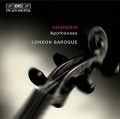
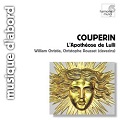 We
owe to François Couperin ‘Le Grand’ the ending of the musical
wars between the French and the Italian styles – to us there seems little
difference between them, but their partisans actually came to blows.
In Couperin’s musical Parnassus both Lully – an Italian who espoused
the French style – and Corelli, the begetter of the Italian style are
reconciled.
We
owe to François Couperin ‘Le Grand’ the ending of the musical
wars between the French and the Italian styles – to us there seems little
difference between them, but their partisans actually came to blows.
In Couperin’s musical Parnassus both Lully – an Italian who espoused
the French style – and Corelli, the begetter of the Italian style are
reconciled.
The music of this period is meat and drink to both sets of performers
and both recordings sound well in both formats. It’s just a shame that
room was not found on either disc for at least some of the movements
from Couperin’s other work on the reconciliation of the style, Les
Goûts réunis, perhaps in preference to the shorter
pieces, good as the performances of these are*.
The important difference between the two recordings is that whereas
London Baroque performs the works as trio sonatas, as designated, William
Christie and Christophe Rousset use the alternative two-harpsichord
format, specifically authorised by Couperin himself. For all the quality
of the two harpsichordists, it’s the BIS version that I am more likely
to choose for future listening and I imagine that most potential purchasers
would agree. My only reservation is the distraction of Charles Medlam
declaiming the words which preface each section – in his best Comédie
Française accent, but rather annoying on repetition. It’s
not even as if the words are quotations from poetry like those which
preface the sections of Vaughan Williams’ Sinfonia Antartica.
When last available on CD, the Harmonia Mundi was at budget price, but
it’s now being offered in some quarters for over £25, so the eclassical.com
price of $9.90 is very reasonable. By an anomaly which I don’t understand,
eclassical.com, who charge by the second, actually offer the longer
BIS recording for a few cents less.
Those in search of a bargain version of the Apothéose de Lulli
will find it coupled with excerpts from Bach’s Musical Offering
on Orion LAN0107 – £4.99 from classicsonline.com.
The performance, by the Alarius Ensemble of Brussels, is decent but
no more – the flute-dominated sound picture is more suited to the Bach
than the Couperin. They also have the Apothéose de Corelli,
with Bach Suite No.2 and music by Corette, on LAN0011.
With Jean-Pierre Rampal playing the flute and directing the ensemble,
this is another flute-dominated and, I’m sorry to say, rather anaemic
recording, sounding older than its date of 1962.
* For the two best-known sonatas from Les Goûts réünis,
also known as Nouveaux Concerts, the Chandos 2-CD set of Couperin’s
Les Nations, performed by the Purcell Quartet, offers No.12 on
CHAN0684
and No.13 on CHAN0729
(available separately, both in mp3, 16– and 24-bit lossless, with pdf
booklets). Stephen Hall had serious reservations about Volume 2 – review
– so you may wish to test-drive first via the Naxos Music Library if
possible. There’s a 2-CD set of the complete Les Goûts réünis
from Les Talens Lyriques/Christophe Rousset (Decca, from 7digital.com);
I haven’t heard it but that too has been described as too serious in
tone, not just in the MusicWeb International review.
The three discs containing Concerts Royaux and Les Goûts
from Musica ad Rhenum’s Brilliant Classics complete set of Couperin’s
chamber music – review
– are available for £5.49 from 7digital.com.
Antonio VIVALDI (1678-1741) Tesori del Piemonte 50: Concerti
da Camera
Trio Sonatas, Op.1, RV61-65, 73, 75, 78, 79
L’Estravagante Ensemble
Pdf booklet included
NAÏVE OP30535 [73:22] – from classicsonline.com
(mp3) or stream from Naxos Music Library
Tesori del Piemonte 51: Violin Concertos Volume 4
Concertos Nos. RV171, 181, 263a, 271, 327, 331, 397 (L’Imperiale)
Il Pomo d’Oro/Riccardo Masahide Minasi (violin)
NAÏVE OP30533 [77:06] – from classicsonline.com
(mp3) or stream from Naxos Music Library
Tesori del Piemonte 52: Violin Concertos Volume 5
Concertos for violin and strings Nos. RV177, 212a, 242, 246, 328, 370,
379 (Concerti per Pisendel)
Il Pomo d’Oro/Dmitry Sinkovsky (violin) – rec. March 2012. DDD
Pdf booklet included
NAÏVE OP30538 [77:47] – from classicsonline.com
(mp3 and lossless) or stream from Naxos Music Library
Concerti per archi – Concerti per strumenti vari vol.
2
Concerto in A, RV159
Concerto in g minor, RV153
Concerto in D, RV121
Concerto in d minor, Madrigalesco, RV129
Concerto in g minor, RV154
Concerto in C, RV115
Concerto in f minor, RV143
Concerto in F, RV141
Concerto in c minor, RV120
Concerto in g minor, RV156
Concerto in A, RV158
Concerto in D, RV123
Concerto Italiano/Rinaldo Alessandrini (harpsichord) – rec. Feb 2003.
DDD.
NAÏVE OPUS111 OP30377 [65:49] – from eclassical.com
(mp3) or stream from Naxos Music Library
[‘[a] sure fire winner.’ See review
by Michael Cookson]
Concerti per l’orchestra di Dresda
Concerto for Multiple Instruments in F, RV569 [12:12]
Concerto in F, RV 568 [15:13]
Concerto in D Per la Solennità di San Lorenzo, RV562 [16:35]
Bassoon Concerto, RV571 [10:01]
Concerto for Multiple Instruments in g minor, RV574 [11:48]
Concerto in F, RV 568: Alternative movement – Grave [1:56]
Les Ambassadeurs/Alexis Kossenko – rec. July 2012. DDD.
Pdf booklet included
ALPHA190 [65:59] – from classicsonline.com
(mp3 and lossless) or eclassical.com
(mp3 and lossless) or stream from Naxos Music Library

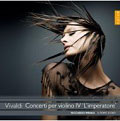

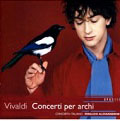 Naïve/Op111:
this series is almost self-recommending by now – but please can we decide
if the recordings are on the Naïve or Opus111 label? I know it’s
the same company, but it’s a bit confusing for the punters especially
if, like me, you save downloads under the name of the label. Only those
who like their Vivaldi a little tamer may wish to look elsewhere – try
the opening movement of RV177 on Volume 52 if you want to see if you
fall into that category.
Naïve/Op111:
this series is almost self-recommending by now – but please can we decide
if the recordings are on the Naïve or Opus111 label? I know it’s
the same company, but it’s a bit confusing for the punters especially
if, like me, you save downloads under the name of the label. Only those
who like their Vivaldi a little tamer may wish to look elsewhere – try
the opening movement of RV177 on Volume 52 if you want to see if you
fall into that category.
Don’t forget Volume 29, Violin Concertos I, on Naïve/Opus11 OP30417,
and Volume 54, Bassoon Concertos III, on OP30539, which I reviewed
in DL
News 2013/2. At the time of writing the eclassical download of the
former was unavailable, presumably till the fault which I mentioned
with track 2 had been put right: meanwhile there’s an mp3-only version
from classicsonline.com.
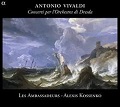 Alpha:
these concertos, composed for Vivaldi’s pupil and colleague, Pisendell
and his Dresden orchestra, are among his finest works and the performances
do them justice.
Alpha:
these concertos, composed for Vivaldi’s pupil and colleague, Pisendell
and his Dresden orchestra, are among his finest works and the performances
do them justice.
The eclassical download became available after I had obtained the lossless
flac from classicsonline. If you just want mp3, honours are about even,
but the eclassical price for flac is the same as for mp3, whereas it’s
£1 or $1 more from classicsonline (mp3 £7.99/$7.99 and flac
£8.99/$8.99), giving eclassical ($11.88 both formats), for whom
this is their first Alpha release, a slight edge price-wise for UK purchasers
at current exchange rates, though not for US purchasers. Moreover, eclassical
allow purchasers to download the flac and return for mp3; if you purchase
the flac from classicsonline and want the mp3 for your personal player,
you’ll have to use a conversion program. Most of the free programs won’t
convert to anything higher than 192kb/s mp3, though you may find one
that will give you 320kb/s wma for your personal player.
Whichever download you choose, you’ll find these performances a little
tamer than those on Naïve/Opus111, despite the violent storm depicted
on the front cover – perhaps that would have been better saved for a
recording of La Tempesta di Mare – but that doesn’t mean that
there isn’t plenty of energy and variety here and the lossless recording
is very good, even when converted to 320kb/s wma for an mp3 player.
This promises to be another fine series; meanwhile you’ll find more
Dresden concertos (for the violin) on four separate Naxos releases,
available from classicsonline.com.
Johann Sebastian BACH (1685-1750) Organ Works II
Toccata and Fugue in d minor, BWV 565 [8:48]
Wie schön leuchtet der Morgenstern, BWV 739 [4:50]
Passacaglia in c minor BWV 582 [13:20]
Toccata, Adagio and Fugue in C, BWV 564: Toccata [6:15]; Adagio [4:11];
Fugue [4:41]
Allein Gott in der Höh sei Ehr: Canto fermo in Soprano,
BWV 662 [7:41]
Allein Gott in der Höh sei Ehr: Canto fermo in Tenore, BWV
663 [7:00]
Trio super Allein Gott in der Höh sei Ehr, BWV 664 [4:47]
Toccata and Fugue in F, BWV 540: Toccata [8:15]; Fugue [5:10]
Fuga sopra il Magnificat, BWV 733 [5:11]
Robert Quinney (Metzler organ of Trinity College, Cambridge) – rec.
2012. DDD
Pdf booklet included
CORO COR16112 [80:22] – from thesixteendigital.com
(mp3, aac and 24-bit lossless)
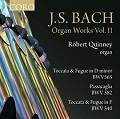 It’s
only a short while ago that I was praising a Resonus recording of Bach
on the Trinity College Organ – RES10120: DL News 2013/8 and Geoff
Molyneux’s equally enthusiastic response, DL News 2013/10. Now comes
another fine Bach recording on that instrument. The Coro programme is
less adventurous than that on Resonus of Clavierübung III,
commencing as it does with the possibly spurious but ubiquitous Toccata
and Fugue in d minor, BWV565, of which Bach and organ lovers surely
have several recordings, but that makes it all the more attractive to
comparative novices. Not that the performances would fail to appeal
to more experienced aficionados, especially as the booklet contains
a discussion of the authenticity of BWV565 – marginally in favour of
Bach’s authorship – and a complete specification of the organ.
It’s
only a short while ago that I was praising a Resonus recording of Bach
on the Trinity College Organ – RES10120: DL News 2013/8 and Geoff
Molyneux’s equally enthusiastic response, DL News 2013/10. Now comes
another fine Bach recording on that instrument. The Coro programme is
less adventurous than that on Resonus of Clavierübung III,
commencing as it does with the possibly spurious but ubiquitous Toccata
and Fugue in d minor, BWV565, of which Bach and organ lovers surely
have several recordings, but that makes it all the more attractive to
comparative novices. Not that the performances would fail to appeal
to more experienced aficionados, especially as the booklet contains
a discussion of the authenticity of BWV565 – marginally in favour of
Bach’s authorship – and a complete specification of the organ.
With the final bonus track, not on the equivalent CD, the download runs
to more than 80 minutes, so the only way to burn it to CDR would be
as an mp3 disc or to forego the bonus. I tried the mp3 download as well
as the 24/96 lossless flac and both are excellent, with a noticeable
advantage to the latter.
Since I recommended the recent Warner release of the complete Teldec
Bach Edition on a single USB I seem to have been recommending so many
excellent alternatives to the very fine performances there as to put
a strain on the bank balances of Bach lovers. Don’t blame me; it’s the
fault of the classical music recording industry for tempting us with
so many goodies.
This is listed as Volume II: its predecessor, containing the Trio Sonatas,
BWV525-530, on COR16095, is not yet available from The Sixteen’s
own digital shop, but can be purchased in mp3 from classicsonline.com
or streamed from Naxos Music Library (both with pdf booklet) or,
for a few pence less but at a lower bit-rate and without booklet, from
amazon.co.uk or emusic.com.
Discovery of the Month
 William
HAYES (1707-1777)
William
HAYES (1707-1777)
The Passions: An Ode for Music (Oxford 1750)
Evelyn Tubb, Ulrike Hofbauer (sopranos), Sumihito Uesugi (counter-tenor),
David Munderloh (tenor), Lisandro Abadie (bass)
Chor der Schola Cantorum Basiliensis
La Cetra Barockorchester Basel/Anthony Rooley – rec. October 2008. DDD.
Pdf booklet with texts included
GLOSSA GCD922501 [75:31] – from classicsonline.com
(mp3) or stream from Naxos Music Library.
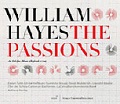 The
only other recording – and that of excerpts only – on the ABC Classics
label is out of stock at the UK distributor and the Capriccio recording
of the orchestral music which Johan van Veen liked – review
– seems to have been deleted, so it’s fortunate that this Glossa version
remains available on CD and as a download.
The
only other recording – and that of excerpts only – on the ABC Classics
label is out of stock at the UK distributor and the Capriccio recording
of the orchestral music which Johan van Veen liked – review
– seems to have been deleted, so it’s fortunate that this Glossa version
remains available on CD and as a download.
The theme of the work, composed for the Oxford degree ceremony in 1750,
concerns the various passions which music arouses, all controlled in
true 18th-centuty fashion, by Reason. There may be no-one here of the
calibre of Emma Kirkby on ABC, though Evelyn Tubb, her partner on two
of my favourite Monteverdi CDs (now budget-price Alto ALC1060
and ALC1160) and on the 7-CD Virgin Classics set of all eight
books of madrigals (0833972), comes pretty close, even if her
voice is a little small-scale for this part. Overall this is an enjoyable
set of performances of music which falls only just short of being worthy
of comparison with Handel. Indeed, Revenge’s music will sound familiar
to those who know Revenge, Timotheus cries from Handel’s Alexander’s
Feast, though just avoiding any charge of plagiarism.
The recording sounds well and the inclusion of the 58-page booklet is
an added bonus. Ignore the classicsonline.com claim to over 2 hours
running time and the information in Naxos Music Library that this is
‘20th Century Baroque’ whatever that may be.
Ludwig van BEETHOVEN (1770-1827) Symphonies
From time to time I like to take stock of basic repertoire recommendations
and there’s nothing more basic than the Beethoven symphonies, which
I last examined in March
2010 – what I’ve written below should be read in parallel with what
I wrote then. Ignore the links to passionato.com, no longer in the download
business.
Those who like to purchase a complete set in one swoop have never been
better served in all categories:
• EMI 4042752: Philharmonia and New Philharmonia/Otto Klemperer
in the complete symphonies and overtures, including both his mono and
stereo recordings of the Third and Fifth Symphonies, on 10 CDs for around
£20, has to be the top recommendation even among other choice
recent reissues on the Klemperer Legacy Edition. Download from sainsburysentertainment.co.uk
(320kb/s) for £13.99 or (256kb/s) from amazon.co.uk
for £11.99.
• If you already have most of the stereo versions, the Naxos Classical
Archives version of the Klemperer mono Eroica can be downloaded
for £1.68 from emusic.com
(not available in USA, Australia and several other countries). The lossless
download from passionato.com listed in March
2010 is no longer available but Naxos Historical 8.111303 listed
then remains available in certain countries at £4.99, with the
EMI version at the same price from sainsburysentertainment.co.uk.
• If you want just one recording from the stereo Klemperer cycle,
my recommendation would be No.6 (Pastoral) with Prometheus and
Coriolan Overtures and incidental music from Egmont on EMI 0094639601554
– download for just £3.99 from classicsonline.com.
• Naïve V5258: La Chambre Philharmonique/Emmanuel Krivine
– see July
2011/1 DL Roundup. This is the version for period-instrument enthusiasts,
yet there’s plenty of power here, too, where it’s necessary. You may
think that this and the Klemperer set would be mutually exclusive, yet
I’d be loath to ditch either of them for my Desert Island selection.
If I couldn’t have them both, I’d have to opt for my ideal compromise,
modern instruments directed with a sense of period style:
• Hyperion CDS44301/5: Scottish Chamber Orchestra (1-8)
and Philharmonia (No.9) /Sir Charles Mackerras, recorded live at the
Edinburgh Festival – Recording of the Month – see review,
review
and March
2010 Roundup.
Any one of these complete editions would do me very nicely – better
still all three – but many collectors prefer single-disc pick and choose
and I made a number of suggestions in that March 2010 Roundup, among
them Osmo Vänskä with the Minnesota Orchestra in Nos. 2 and
7 (BIS-SACD-1816) and No.9 (BIS-SACD-1616). I gave links
to emusic.com, amazon.com and classicsonline.com, all in mp3 only and,
in the case of the first two, at less than the ideal 320kb/s. eclassical.com
offer the whole series at competitive prices and with pdf booklets,
in mp3 and lossless sound and, for a little extra, 24-bit; I list the
whole series below:
• Symphonies Nos. 1 and 6 (Pastoral): BIS-SACD-1716
– here;
• Symphonies Nos. 2 and 7: BIS-SACD-1816 – here;
• Symphonies Nos. 3 (Eroica) and 8: BIS-SACD-1516 –
here;
• Symphonies Nos. 4 and 5: BIS-SACD-1416 – here;
• Symphony No.9 (Choral): BIS-SACD-1616 – here.
It’s hardly surprising that these recordings regularly feature in eclassical.com’s
top 25 best sellers – as I write BIS-1616 is No.9 and 1516
is No.24.
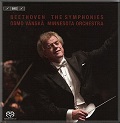 If
you’re happy with mp3 at around 256kb/s and would like to save on the
complete set, amazon.co.uk
offer it for £22.99, but some dealers have the physical set
for around that price, 5 CDs for the price of 2 (BIS-SACD-1825/26).
Though I’ve listed the individual recordings as an alternative to a
complete set, you may find after hearing one that you’re tempted to
buy the lot. There are absolutely no duds here – don’t just take my
word; read Dominy Clements’ review
of the complete set: Recording of the Month. Sample individual
recordings in the series from Naxos Music Library.
If
you’re happy with mp3 at around 256kb/s and would like to save on the
complete set, amazon.co.uk
offer it for £22.99, but some dealers have the physical set
for around that price, 5 CDs for the price of 2 (BIS-SACD-1825/26).
Though I’ve listed the individual recordings as an alternative to a
complete set, you may find after hearing one that you’re tempted to
buy the lot. There are absolutely no duds here – don’t just take my
word; read Dominy Clements’ review
of the complete set: Recording of the Month. Sample individual
recordings in the series from Naxos Music Library.
Three releases on PentaTone from Philippe Herreweghe with the Royal
Flemish Phliharmonic Orchestra are also very worthwhile:
• PTC5186313: Symphonies Nos. 1 and 3 – CD only, no download
available
• PTC5186314: Symphonies Nos. 2 and 6 – from eclassical.com
(mp3 and lossless) or stream from Naxos Music Library
• PTC5186315: Symphonies Nos. 4 and 7 – from eclassical.com
(mp3 and lossless) or stream from Naxos Music Library – review
• PTC5186316: Symphonies Nos. 5 and 8 – from eclassical.com
(mp3 and lossless) or stream from Naxos Music Library
• PTC5186317: Symphony No. 9 (Choral) – from classicsonline.com
(mp3, with booklet) or stream from Naxos Music Library
Like Mackerras (Hyperion) Herreweghe puts his experience with period
ensembles to good use with a modern-instrument orchestra. See Simon
Thompson’s review
of the whole cycle.
Another period-instrument set recorded live offers strong competition
for the Krivine on Naïve and it’s available in lossless as well
as mp3:
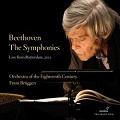 Glossa
GCDSA921116: Beethoven – The Symphonies Live from Rotterdam:
Orchestra of the Eighteenth Century/Frans Brüggen – from eclassical.com.
It involves a larger layout than most of the sets listed above ($63.80)
but it’s money well spent especially if, for any reason, the Krivine
doesn’t appeal or you insist on having lossless. With this download,
indeed, as with all eclassical.com downloads, it’s possible to download
one format and return for the other – flac for your audio system and
mp3 for your personal player. There’s no booklet, but that’s not the
major handicap it would be with opera or choral music; in any case,
subscribers to Naxos Music Library can obtain it there and compare it
with Krivine. Review in DL
News 2013/1.
Glossa
GCDSA921116: Beethoven – The Symphonies Live from Rotterdam:
Orchestra of the Eighteenth Century/Frans Brüggen – from eclassical.com.
It involves a larger layout than most of the sets listed above ($63.80)
but it’s money well spent especially if, for any reason, the Krivine
doesn’t appeal or you insist on having lossless. With this download,
indeed, as with all eclassical.com downloads, it’s possible to download
one format and return for the other – flac for your audio system and
mp3 for your personal player. There’s no booklet, but that’s not the
major handicap it would be with opera or choral music; in any case,
subscribers to Naxos Music Library can obtain it there and compare it
with Krivine. Review in DL
News 2013/1.
I thought the Decca box set of Daniel Barenboim performances of all
nine symphonies (Beethoven for All 478 3511 or Linn UNI030
in Studio Master Sound) something of a mixed blessing – September
2012/1 DL Roundup.
In addition to the recordings listed above, you’ll find a review of
the Fifth and Seventh Symphonies from John Eliot Gardiner (SDG717)
and an inexpensive Beulah Extra reissue of Klemperer’s First Symphony
(6-9BX114) in DL
News 2013/1. For Colin Davis’s wonderful first (HMV) recording of
the Seventh Symphony, restored to us by Beulah (15-18BX129) see
February
2012/1 DL Roundup.
Hector BERLIOZ (1803-1869)
Les Nuits d’été, Op.7 [28:33]
Roméo et Juliette, Op.17: Love Scene [16:48]
La Mort de Cléopâtre – Scène lyrique [20:05]
Karen Cargill (mezzo)
Scottish Chamber Orchestra/Robin Ticciati
Pdf booklet with texts and translations included
LINN CKD421 [65:48] – from
linnrecords.com (SACD, mp3, 16-bit, 24/96 and 24/192 downloads)
or stream from Naxos Music Library (no booklet)
Hector BERLIOZ Les Nuits d’été, Op.7* [30:35]
Maurice RAVEL (1875-1937) Shéhérazade* [15:40]
Claude DEBUSSY (1862-1918) Trois chansons de Bilitis [9:40]
Francis POULENC (1899-1963) Chanson d’Orkenise [1:28]
Hôtel [2:05]
La Courte Paille: Le Carafon [1:06]
La Courte Paille: La Reine de Coeur [2:07]
Chansons villageoises: Les gars qui vont à la fête
[1:45]
Deux Poems de Louis Aragon: 1. ‘C’ [3:00]
Régine Crespin (soprano)
L’Orchestre de la Suisse Romande/Ernest Ansermet*; John Wustman (piano)
– rec. 1963, 1967. ADD
DECCA ORIGINALS 4757712 [68:28] – from 7digital.com
(mp3)
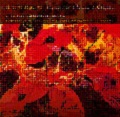
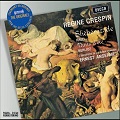 The
classic Janet Baker performance of Les Nuits d’Eté is
now yoked to a less recommendable recording of the complete Roméo
et Juliette on an EMI twofer (Gemini 2176402). I thought
this an unequal coupling – review;
though it’s well worth having for Dame Janet’s contribution, that is
now shorn of its original couplings to make way for a work which needs
Colin Davis’s hand to succeed. The quality of Cléopâtre
on the new Linn recording makes me wish all the more that EMI had managed
to fit Janet Baker’s performance onto their Gemini set instead of making
prospective purchasers buy a second Gemini set on which it is included
(3814932, with La Damnation de Faust).
The
classic Janet Baker performance of Les Nuits d’Eté is
now yoked to a less recommendable recording of the complete Roméo
et Juliette on an EMI twofer (Gemini 2176402). I thought
this an unequal coupling – review;
though it’s well worth having for Dame Janet’s contribution, that is
now shorn of its original couplings to make way for a work which needs
Colin Davis’s hand to succeed. The quality of Cléopâtre
on the new Linn recording makes me wish all the more that EMI had managed
to fit Janet Baker’s performance onto their Gemini set instead of making
prospective purchasers buy a second Gemini set on which it is included
(3814932, with La Damnation de Faust).
Suzanne Danco’s recording is even more of a classic and its reappearance
on Decca Originals is very welcome – just £4.99 from 7 digital.com;
be careful not to choose the more expensive Decca Classic Sound version.
Though I’m a declared outright fan of Janet Baker, I’m not sure that
I wouldn’t prefer the Danco on my desert island, especially as the couplings
are equally recommendable. Though in mp3 only (at the full 320kb/s)
the recording still sounds very well, but the lack of texts is a setback.
Though I wouldn’t want to be without either of those classic recordings,
it’s not just the availability of SACD or 24-bit sound or the all-Berlioz
coupling that makes me recommend Karen Cargill on the new Linn
CD. Listening late on a hot July evening I was completely entranced.
Even if you are happy with mp3 only, there’s not much point in saving
a penny by purchasing from classicsonline.com (£7.99) and foregoing
the booklet). Linn’s prices range from £8.00 (mp3) to £18
(24/96 or 24/192), all with booklet. I tried the mp3 and 24/96 versions
and both sound excellent.
Bargain of the Year
Richard WAGNER (1813-1883)
 Der
Ring des Nibelungen (1869-1876)
Der
Ring des Nibelungen (1869-1876)
Albert Dohmen (Wotan); Linda Watson (Brünnhilde); Stephen Gould
(Siegfried); Andrew Shore (Alberich); Gerhard Siegel (Mime); Hans-Peter
König (Hagen); Eva-Maria Westbroek (Sieglinde); Endrik Wottrich
(Siegmund); Christa Mayer (Waltraute); Michelle Breedt (Fricka); Ralf
Lukas (Gunther); Edith Haller (Gutrune); Kwangchul Youn (Hunding)
Bayreuth Festspiele Chorus and Orchestra/Christian Thielemann – rec.
live, Summer 2008.
OPUS ARTE OACD9000BD [14 CDs: 14:50:00] – from amazon.co.uk
(mp3)
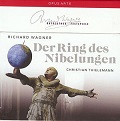 At
£4.49 this is either a huge mistake or the bargain of bargains
– the CD set costs in the region of £90 and Amazon charge £14.98
for the 2-CD download highlights of the set; Siegfried alone
costs £16.49 and there’s an alternative amazon.co.uk download
for £53.49! I advise taking immediate advantage of this crazy
economic anomaly.
At
£4.49 this is either a huge mistake or the bargain of bargains
– the CD set costs in the region of £90 and Amazon charge £14.98
for the 2-CD download highlights of the set; Siegfried alone
costs £16.49 and there’s an alternative amazon.co.uk download
for £53.49! I advise taking immediate advantage of this crazy
economic anomaly.
7digital.com have the Swarowksy Ring for the same £4.49, but I
had some reservations about that in my 2013/5
DL News. Though the amazon.co.uk transfer is at less than 256kb/s
and the Swarowsky from 7digital is at 320, the more recent provenance
of the Opus Arte means that it sounds better.
Opinions about the quality of the performances have ranged from Editor’s
Choice, and five stars from some purchasers, to one star from another
purchaser, with our own Tony Duggan in the middle, recognising the set’s
many virtues but also pointing out some of its vocal shortcomings –
review.
In fact, some of the best singing is to be heard in the smaller roles,
but none of it is less than acceptable, though experienced Wagnerites
will have to put the great singers of the past out of mind. On the plus
side, Christian Thielemann is as accomplished a conductor as you are
likely to find.
The recording, though somewhat short of Amazon’s declared 256kb/s –
more like 220-230 – is perfectly acceptable. Even Winamp and Songbird
couldn’t smooth over one or two minute hiatuses between tracks – an
inherent problem still with mp3 opera. Surprisingly, the latest version
of iTunes did a better job. There are no texts, but these can be found
online – better still look for a second-hand copy of the Faber edition
of the original text with Andrew Porter’s working English translation.
For all my mostly minor misgivings, anyone needing a complete Ring and
unable to raise the wind for Solti (c.£75 as a download), Barenboim
(c.£29), Karajan (c.£35) or Böhm (c.£35) need
not hesitate.
Don’t forget the two instalments of what I hope is building towards
a Hallé/Elder Ring cycle: die Walküre (CDHLD7531,
4 CDs plus libretto CD, £22 from MWI – here:
review
– review
– review)
and Götterdämmerung (CDHLD7525, 5 CDs, £23
from MWI – here
– or CDHLM7530, mp3 format, £11 from MWI here:
see joint review
of both formats). Without wishing to blow the MusicWeb International
trumpet, most downloads work out more expensive than buying the CDs,
apart from 7digital.com who offer each in mp3, without libretto, for
£7.99.
Fans of Wagner in English in the Andrew Porter translation are well
served by the Chandos recordings with Reginald Goodall and the ENO,
available as a CD set, though the operas must be purchased separately
as downloads now that the USB Ring – review
– like all Chandos’s USBs, has shuffled off this mortal coil:
• The Rhinegold (CHAN3054)
• The Valkyrie (CHAN3038)
• Siegfried (CHAN3045)
• Twilight of the Gods (CHAN3060, excerpts CHAN8534
or, slightly less expensively, CHAN6593)
• Sampler (CHAN0019)
Johannes BRAHMS (1833-1897)
Symphony No.1 in c minor, Op.68 (1876) [45:00]
Liebeslieder-Walzer from Op.52 and Op.65 (1869-70) [12:00]
Hungarian Dances: Nos.1, 3 and 10 [7:27]
Swedish Chamber Orchestra/Thomas Dausgaard – rec. March 2011 DDD/DSD
Pdf booklet included
BIS– SACD-1756 [64:27] – from eclassical.com
(mp3, 16– and 24-bit lossless) or stream from Naxos Music Library
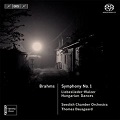 The
giants of recorded Brahms when I was finding my feet in his symphonic
output were Walter (Columbia/CBS), Giulini (UK Columbia) and Klemperer
(HMV). The last of these still provides my benchmark, especially for
Symphonies 3 and 4, and his complete cycle has just been reissued again
by EMI along with a great deal more valuable Klemperiana at unbelievably
inexpensive prices. Klemperer’s Brahms is large-scale and craggy, though
by no means as slow as you might expect – the big tune in the finale
of No.1, for example, is much livelier than you might expect – while
the Dausgaard recording comes in the BIS Opening Doors series
with smaller forces than usual. How does the new version fare in comparison
with those giants of the past?
The
giants of recorded Brahms when I was finding my feet in his symphonic
output were Walter (Columbia/CBS), Giulini (UK Columbia) and Klemperer
(HMV). The last of these still provides my benchmark, especially for
Symphonies 3 and 4, and his complete cycle has just been reissued again
by EMI along with a great deal more valuable Klemperiana at unbelievably
inexpensive prices. Klemperer’s Brahms is large-scale and craggy, though
by no means as slow as you might expect – the big tune in the finale
of No.1, for example, is much livelier than you might expect – while
the Dausgaard recording comes in the BIS Opening Doors series
with smaller forces than usual. How does the new version fare in comparison
with those giants of the past?
Much hinges on the finale and the big tune which immediately earned
the comparison with Beethoven that Brahms had feared and which had delayed
his foray into the symphony – he laughed off the cries of ‘Beethoven’s
Tenth’ with a retort that any donkey could see the similarity. We know
that it’s coming but a good conductor makes us savour the rest of the
movement first, with its hints of what is to come, and Dausgaard does
just that without unduly hanging around. This performance may take some
time to grow on the listener but I’m sure that it will do 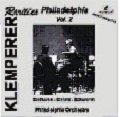 just
that. With enjoyable performances of the Liebeslieder waltzes
and three Hungarian Rhapsodies as fillers and good recording, especially
in 24-bit sound, this will find a place in my listening as an alternative
to Klemperer.
just
that. With enjoyable performances of the Liebeslieder waltzes
and three Hungarian Rhapsodies as fillers and good recording, especially
in 24-bit sound, this will find a place in my listening as an alternative
to Klemperer.
I’ve been listening to a live Klemperer recording of Brahms’ Third
Symphony (Archiphon ARC-WU-139 [80:46]). Klemperer drives
Eugene Ormandy’s de luxe Philadelphia Orchestra in a performance that
matches his EMI version and, though less well recorded, adds that little
extra frisson of a live concert. The couplings are Beethoven’s Egmont
Overture – again that little bit more exciting than the studio recordings
– and Schumann’s Fourth Symphony. Download in mp3 from classicsonline.com,
rather extravagantly spread over 2 CDs when omission of the radio announcements
would have brought it down to a single disc.
George Whitefield CHADWICK (1854-1931)
Symphonic Sketches (1895-1905) [30.07]
Melpomene Overture (1887) [13.03]
Tam O’Shanter (Symphonic Poem) (1915) [19.27]
Suite Symphonique (1909) [35.62]
Aphrodite (Symphonic Poem) (1910) [28.18]
Elegy (1887) [7.50]
Czech State PO/Jose Serebrier – rec. 1995/96
Abridged pdf booklet included
REFERENCE RECORDINGS RR-2104CD [62:50+72:25] – from classicsonline.com
(mp3) or stream from Naxos Music Library
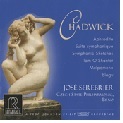 ['This
is warmly recommended for fine rare repertoire and typically sprung,
lively sound with power and subtlety aplenty.' See review
by Rob Barnett]
['This
is warmly recommended for fine rare repertoire and typically sprung,
lively sound with power and subtlety aplenty.' See review
by Rob Barnett]
This is the kind of music that sounds familiar and you think you ought
to be able to recognise it, but can’t quite place it. Could it be Dvořák,
or is it early Delius? It isn’t either but that suggests that Chadwick
found it hard to develop an individual voice, though I enjoyed hearing
everything here, thanks to the advocacy of all concerned. Despite the
flow of incessant new recordings clamouring for attention I shall be
listening to more of Chadwick’s music in Naxos American Classics recordings.
The mp3 transfer is good but the pdf booklet, which Rob Barnett found
so helpful, is severely truncated – just the front and back covers and
one random page from inside.
Sergei TANEYEV (1856-1915) Complete String Quartets Volume 3
String Quartet No.7 in E flat [38:05]
String Quartet No.5 in A, Op. 13 [24:10]
Carpe Diem String Quartet (Charles Wetherbee, John Ewing (violin); Korine
Fujiwara (viola); Kristin Ostling (cello)) – rec. December 2010. DDD
Pdf booklet available
NAXOS 8.573010 [62:14] – from classicsonline.com
(mp3) or eclassical.com
(mp3 and lossless) or stream from Naxos Music Library
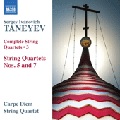 Once
again Naxos rides to the rescue of music which has not heretofore received
its due, with only the eponymous Taneyev Quartet otherwise undertaking
a complete set of these string quartets at full price on the Northern
Flowers label. Those rival recordings are available as downloads from
eclassical.com in mp3 and lossless sound and at budget price from classicsonline.com
in mp3; Gavin Dixon enjoyed the first volume of that series – review
– and thought Volume 5 – review
– and Volume 6 adequate – review
– but was not impressed by Volume 3 – review.
With tuning not always reliable and sound dating from the 1970s on that
series, the Naxos series, at budget price is probably the better buy.
Once
again Naxos rides to the rescue of music which has not heretofore received
its due, with only the eponymous Taneyev Quartet otherwise undertaking
a complete set of these string quartets at full price on the Northern
Flowers label. Those rival recordings are available as downloads from
eclassical.com in mp3 and lossless sound and at budget price from classicsonline.com
in mp3; Gavin Dixon enjoyed the first volume of that series – review
– and thought Volume 5 – review
– and Volume 6 adequate – review
– but was not impressed by Volume 3 – review.
With tuning not always reliable and sound dating from the 1970s on that
series, the Naxos series, at budget price is probably the better buy.
This is the third disc in the series, which has been feeding through
at sporadic intervals; the earlier volumes have been well received on
MusicWeb International:
• Volume 1 (Quartets 1 and 3) 8.570437 [61:39] – from classicsonline.com
(mp3) or stream from Naxos Music Library – review
and review
• Volume 2 (Quartets 2 and 4) 8.572421 [73:10] – from classicsonline.com
(mp3) or stream from Naxos Music Library – review
The music is small beer by comparison with the late Beethoven and Schubert
Quartets and the Shostakovich Quartets (below) but it is tuneful and
attractive and the Carpe Diem Quartet make a good case for it. I haven’t
heard the eclassical.com lossless flac which, at $11.20, is more expensive
than the CD, but the classicsonline.com mp3 is fine – now that classicsonline.com
are offering recent Naxos recordings in mp3 and flac, I’m surprised
that this recording is not among them.
Gustav MAHLER (1860-1911)
Symphony No. 2 in c minor Resurrection (1888-1894)
Emilia Cundari (soprano)
Maureen Forrester (contralto)
Westminster Choir
New York Philharmonic Orchestra/Bruno Walter
rec. February 1957 and February 1958, Carnegie Hall, New York
32-bit XR re-master by Andrew Rose, April 2013. First issued as Columbia
M2L 256
PRISTINE AUDIO PASC385 [79:40] – from Pristine
Classical (24-bit flacs)
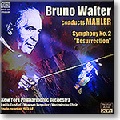 Andrew
Rose’s re-mastered CD of Bruno Walter’s 1947 Mahler Fifth impressed
me a great deal – review
– not least because it freshened up the original sound in a most convincing
and congenial way. That’s not always a given, as I’ve discovered with
similar releases from other sources, such as HDTT. Indeed, Rose’s techniques
are viewed with hostility in some quarters, but on the strength of that
Mahler 5 – my first exposure to a Pristine product – such reactions
seemed more than a little extreme. Yes, I did have a few reservations
about the sonics – the odd timp sound, for instance – but taken in
toto Rose’s efforts strike me as very worthwhile.
Andrew
Rose’s re-mastered CD of Bruno Walter’s 1947 Mahler Fifth impressed
me a great deal – review
– not least because it freshened up the original sound in a most convincing
and congenial way. That’s not always a given, as I’ve discovered with
similar releases from other sources, such as HDTT. Indeed, Rose’s techniques
are viewed with hostility in some quarters, but on the strength of that
Mahler 5 – my first exposure to a Pristine product – such reactions
seemed more than a little extreme. Yes, I did have a few reservations
about the sonics – the odd timp sound, for instance – but taken in
toto Rose’s efforts strike me as very worthwhile.
For comparison I dusted off my CBS Maestro set of this Walter Resurrection
– coupled with the First – on M2YK 45674. It’s years since I
last heard this recording and although time isn’t always kind to once-favoured
performances I was surprised – and a little disappointed – by Walter’s
measured way with the Trauermarsch; as for the early stereo sound
it’s warm and rather veiled, as if the orchestra were playing behind
a thick curtain. That wasn’t how I remembered it, but then I’ve heard
so many fine, state-of-the-art recordings of this symphony since then.
Listening to Rose’s take on the first movement was not so much a surprise
as a shock; far too much of the recorded ambience has disappeared and
the newly highlighted string sound is a little steely. Even worse, the
sense of a dynamic, living event in a sizeable space has been lost;
the end result sounds oddly synthetic. Interpretively this Mahler 2
does get better as it progresses, with Walter at his open-hearted best
in those Wunderhorn moments; not only that, he has an unerring
grasp of the symphony’s long spans and creates terrific tension as we
move towards that pate-cracking finale.
The two soloists and chorus are more than acceptable and – as I remembered
– Walter paces ‘Urlicht’ most beautifully. My initial reservations about
the Pristine sound were forgotten at that point, only to return with
a vengeance in the long build-up to the chorus’s first quiet entry.
Somehow the sound has been shrivelled – de-natured might be a better
term – and what ought to be firm and expansive sounds rather hollow
and imprecise. Admittedly the original is far from perfect, but at least
it has body and coherence; even more important, it’s involving.
Indeed, that odd lack of togetherness – almost as if the music has been
taken apart and imperfectly reassembled – is what distresses me most
about this re-mastering. Lower strings are disembodied, the chorus sounds
like it’s miles away and – inexplicably – the pulse has become faint.
I can only assume that Rose’s methods – so successful in that mono Fifth
– are ill-suited to what is, in any case, a decent stereo Second. As
if that weren’t enough the organ’s added heft just doesn’t ring true.
I so wanted to enjoy and endorse this re-mastered Resurrection, but
such is the level of intervention that I can’t do either. I haven’t
heard enough Pristine releases to know whether this is just a one-off,
but what this re-mastering does do is demonstrate just why Rose’s techniques
are so controversial.
Dan Morgan
http://twitter.com/mahlerei
Great Works for Flute and Orchestra
Carl NIELSEN (1865-1931) Concerto for Flute and Orchestra, FS119
[16:16]
Charles Tomlinson GRIFFES (1884-1920) Poem for Flute and Orchestra
(1918) [9:57]
Carl REINECKE (1824-1910) Concerto for Flute and Orchestra in
D, Op.283 [18:08]
Cécile CHAMINADE (1857-1944) Concertino for Flute and
Orchestra, Op.107 [7:07]
Pyotr Ilyich TCHAIKOVSKY (1840-93), adapted by Ernest Sauter
Largo and Allegro for flute and strings (1863-64)
[3:53]
Francis POULENC (1899-1963), orch. Lennox Berkeley Flute
Sonata (1956-57) [11:27]
Nikolai RIMSKY-KORSAKOV (1844-1908), arr. Kalevi Aho The
Flight of the Bumblebee (1899-1900) [1:02]
Sharon Bezaly (flute)
Residentie Orkest Den Haag/Neeme Järvi – rec. 2011. DDD/DSD
Pdf booklet included
BIS-SACD-1679 [69:25] – from eclassical.com
(mp3, 16– and 24-bit lossless)
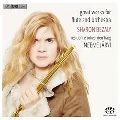 Familiar
works top and tail this recording, albeit that two of them are in unfamiliar
form. The Nielsen which opens the proceedings is the weightiest music
here and competition is strong, in the form of all-Nielsen programmes,
and all-flute recordings. If you want all three of the Nielsen concertos,
for clarinet, flute and violin, the obvious benchmark is Chandos CHAN8894,
but if you already have a recording of the Violin and/or Clarinet Concerto
– perhaps the Fröst recording of the latter on BIS-SACD-1463,
with Aho (review:
download from eclassical.com
or stream from Naxos Music Library) – the new BIS recording of the Flute
Concerto will do very nicely.
Familiar
works top and tail this recording, albeit that two of them are in unfamiliar
form. The Nielsen which opens the proceedings is the weightiest music
here and competition is strong, in the form of all-Nielsen programmes,
and all-flute recordings. If you want all three of the Nielsen concertos,
for clarinet, flute and violin, the obvious benchmark is Chandos CHAN8894,
but if you already have a recording of the Violin and/or Clarinet Concerto
– perhaps the Fröst recording of the latter on BIS-SACD-1463,
with Aho (review:
download from eclassical.com
or stream from Naxos Music Library) – the new BIS recording of the Flute
Concerto will do very nicely.
Between this and the more familiar music at the end comes a series of
enjoyable discoveries – maybe nothing to get excited about but well
worth hearing.
There are good recordings of the Poulenc in its original guise, but
I enjoyed hearing the orchestration by the composer’s friend Lennox
Berkeley and may well prefer to hear the music in this form in future.
The programme is rounded off by an enjoyable arrangement of Rimsky’s
Bumble Bee, specially composed for Sharon Bezaly by Kalevi Aho.
For all my enjoyment of the new recording, I enjoyed even more hearing
the reissue of an earlier Sharon Bezaly album, offered for a short time
at a 30% discount with the new recording:
Bridge across the Pyrenees
Joaquín RODRIGO Concierto pastoral for flute and orchestra
(1978) [25:19]
François BORNE Fantaisie brillante sur des airs de
Carmen (arranged for flute and orchestra by Giancarlo Chiaramello)
[11:09]
Jacques IBERT Concerto for flute and orchestra (1934) [19:15]
Sharon Bezaly (flute)
São Paulo Symphony Orchestra (OSESP)/John Neschling – rec. 2005.
DDD/DSD
Pdf booklet included
BIS-SACD-1559 [56:50] – from eclassical.com
(mp3, 16– and 24-bit repertoire)
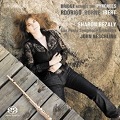 Even
Dominy Clements’ only complaint, concerning the short-ish playing time
(review),
is taken care of by the eclassical policy of charging per second. Though
the special offer will have ended by the time that you read this – but
look out for their regular appearance, also eclassical’s daily discounts
– this is well worth having at the regular price.
Even
Dominy Clements’ only complaint, concerning the short-ish playing time
(review),
is taken care of by the eclassical policy of charging per second. Though
the special offer will have ended by the time that you read this – but
look out for their regular appearance, also eclassical’s daily discounts
– this is well worth having at the regular price.
You’ll find details of the many distinguished recording which Sharon
Bezaly has made for BIS by typing her name into the search engine on
eclassical.com. Reviews of the last two albums which I encountered,
with very different repertoire can be found in DL
News 2012/13 (Pipe Dreams) and here
(Barocking Together).
Ralph VAUGHAN WILLIAMS (1872-1958)
Symphony No.3 Pastoral [33:46]
Symphony No.5 [37:38]
Margaret Price (soprano)
London Philharmonic Orchestra; New Philharmonia Orchestra/Sir Adrian
Boult
EMI 0077776401850 [71:24] – from classicsonline.com
(mp3) or stream from Naxos Music Library
Norfolk Rhapsody No.2 [9:15]
Symphony No.3 Pastoral [39:00]
The Running Set [6:33]
Norfolk Rhapsody No.1 [11:25]
London SO/Richard Hickox
Pdf booklet included
CHANDOS CHAN10001 or CHAN5002 [66:26] – from theclassicalshop.net
(mp3, 16– and 24-bit lossless – also on SACD CHSA5002)
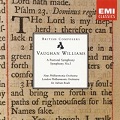
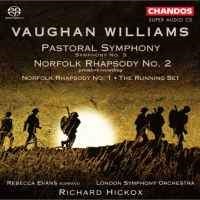 EMI’s
recent reissue of the stereo Boult VW Symphonies, orchestral works and
Pilgrim’s Progress on 13 CDs offers a marvellous bargain for
around £25, but many potential purchasers will have some of the
contents already, especially as Pilgrim’s Progress has recently
been reissued again. For some, therefore, individual albums remain more
attractive; though no longer to be had on CD except often at ridiculous
prices, most of them are available from classicsonline.com for £4.99,
some at £6.99. I’ve picked the two symphonies here as representative
of the whole series – perhaps marginally less recommendable as performances
than the mono set which I’ve praised so many times, though there’s not
much in it, but better recorded.
EMI’s
recent reissue of the stereo Boult VW Symphonies, orchestral works and
Pilgrim’s Progress on 13 CDs offers a marvellous bargain for
around £25, but many potential purchasers will have some of the
contents already, especially as Pilgrim’s Progress has recently
been reissued again. For some, therefore, individual albums remain more
attractive; though no longer to be had on CD except often at ridiculous
prices, most of them are available from classicsonline.com for £4.99,
some at £6.99. I’ve picked the two symphonies here as representative
of the whole series – perhaps marginally less recommendable as performances
than the mono set which I’ve praised so many times, though there’s not
much in it, but better recorded.
Chandos: an alternative view of the Pastoral Symphony
which competes strongly with either of the Boult recordings. The fillers
may be less attractive than the Fifth Symphony on EMI but well worth
hearing. Though the mp3 transcript of the Boult is very good, this download
comes in 16– and 24-bit lossless sound at a slightly higher price and
with a pdf booklet. You may wish to wait for the SACD and download to
reappear, as they surely must, at a lower price on the Chandos Hickox
Edition.
For the Hickox recording of the Fifth Symphony and associated works,
derived like the symphony from the Pilgrim’s Progress project,
on CHAN9666, see my review
of the USB release of all the symphonies recorded by Hickox – no longer
available in that format – and for the recent Hallé/Elder recording
of Symphonies 5 and 8 (CDHLL7533) DL
News 2013/6.
In the Shadow of War
Ernest BLOCH (1880-1959) Schelomo, Hebrew Rhapsody (1916)
[21:22]
FRANK BRIDGE (1879-1941) Oration, Concerto Elegiaco (1930) [29:11]
Stephen HOUGH (b. 1961) The Loneliest Wilderness (2005)* [16:09]
Steven Isserlis (cello)
Deutsches Symphonie-Orchester Berlin/Hugo Wolff (Bloch/Bridge)
*Tapiola Sinfonietta/Gabor Takacs-Nagy (Hough)
rec. January 2012, Jesus-Christus-Kirche, Berlin-Dahlem, Germany (Bloch/Bridge);
November 2009, Tapiola Concert Hall, Finland (Hough)
Pdf booklet included
BIS-SACD-1992 [67:40] – from eclassical.com
(mp3, 16– & 24-bit flac)
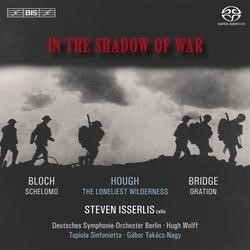 I
first heard Steven Isserlis in John Tavener’s The Protecting Veil,
a recording I grew to dislike intensely because it was played to death
at the time. I haven’t encountered the cellist since, [try his multi-award-winning
Bach Cello Suites, Hyperion CDA67541/2
– BW]* so this new collection is a good opportunity to
play catch-up. It’s one of BIS’s more creatively programmed efforts,
coupling the well-known Bloch with the less familiar Bridge and the
unknown – to me at least – Hough piece.
I
first heard Steven Isserlis in John Tavener’s The Protecting Veil,
a recording I grew to dislike intensely because it was played to death
at the time. I haven’t encountered the cellist since, [try his multi-award-winning
Bach Cello Suites, Hyperion CDA67541/2
– BW]* so this new collection is a good opportunity to
play catch-up. It’s one of BIS’s more creatively programmed efforts,
coupling the well-known Bloch with the less familiar Bridge and the
unknown – to me at least – Hough piece.
Schelomo – Hebrew for Solomon – is a darkly impassioned piece
written in the midst of the Great War. Veering between hope and despair
it’s a remarkably compact work that demands much of its interpreters.
Isserlis is certainly up to the task – he produces a firm, well-rounded
sound that never becomes stressed, even in the music’s more demanding
passages – but I had to crank up the volume before it all snapped into
place. That said the orchestral image remains diffuse and balances are
unconvincing; also, the soloist may seem too recessed for those used
to, say, Fournier’s classic account (DG). So, a deeply felt performance
hampered by sub-par sonics.
Make no mistake Isserlis plays well, and that’s what really matters.
I did wonder how he would compare with Alban Gerhardt, whose fiercely
eloquent reading of Bridge’s Oration impressed me so (review).
Although the piece was penned in 1930 it’s a direct and very personal
response to the First World War; from the cello’s keening first entry
it’s clear Isserlis has the measure of the piece. Gerhardt digs deeper
though, and he finds more colour and contrast too. Also, the spacious
and better balanced Chandos recording is more to my taste.
Those familiar with Stephen Hough the virtuoso pianist will be intrigued
– as I was – to hear his composition The Loneliest Wilderness,
based on a poem by Herbert Read. Also inspired by the Great War it has
a lovely, singing cello line that rises above an austerely beautiful
orchestral base. The tone of lament is unmistakable, allied to a sense
of nostalgia that brings to mind Housman’s ‘land of lost content’. Those
gentle harp figures are just gorgeous, and the recording has a richness
and clarity that I don’t hear in the Bloch and Bridge. Happily the balances
are much more satisfying too.
The Hough is a real find, and I suspect it will be the piece I return
to most. As good as the other two readings are they are resolutely –
and inexplicably – uninvolving. That’s probably the result of an excellent
soloist fettered by pedestrian accompaniment and less than first-class
sonics. Yes, this is a 44.1kHz original, but other BIS recordings of
a similar provenance sound far better than this. Thankfully the Tapiola
band seem more committed, and the sound is airier and better focused.
Steven Isserlis provides very readable liner-notes.
Worth hearing for the Hough alone; look elsewhere for the other works.
Dan Morgan
http://twitter.com/mahlerei
* His recording of the two Dvořák Cello Concertos with the
Mahler CO and Daniel Harding is due for release on Hyperion CDA67917
in October 2013.
[Since Dan has reviewed the 24-bit version, I tried the other end of
the spectrum, the 320kb/s mp3, and found that equally good of its kind.
BW]
Ernest BLOCH (1880-1959)
Voice in the Wilderness: Symphonic Poem [27:57]
Schelomo: Hebrew Rhapsody [20:20]
Zara Nelsova (cello)
London Philharmonic Orchestra/Ernest Ansermet – rec. 1955. ADD/mono
NAXOS CLASSICAL ARCHIVES 9.80809 [48:17] – from eclassical.com
(mp3 and lossless) [also available in mp3 from classicsonline.com and
emusic.com.]
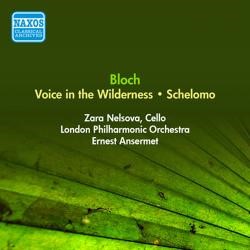 I’d
written this review before I received Dan’s thoughts on the new BIS
recording. Zara Nelsova’s Bloch has strong claims to authenticity –
she studied with the composer, who dedicated some of his music to her
and used to refer to her as ‘Madame Schelomo’. This was her second
recording of that work (Decca LXT5062); she had previously recorded
it with Bloch himself, and it was always considered preferable to that
earlier version. You may prefer to play the works in reverse order,
as I did by mistake; though both are filled with sadness that lies too
deep for tears, Voice in the Wilderness ends on a more positive
note, Bloch having re-read and re-interpreted the Book of Ecclesiastes
in the interim.
I’d
written this review before I received Dan’s thoughts on the new BIS
recording. Zara Nelsova’s Bloch has strong claims to authenticity –
she studied with the composer, who dedicated some of his music to her
and used to refer to her as ‘Madame Schelomo’. This was her second
recording of that work (Decca LXT5062); she had previously recorded
it with Bloch himself, and it was always considered preferable to that
earlier version. You may prefer to play the works in reverse order,
as I did by mistake; though both are filled with sadness that lies too
deep for tears, Voice in the Wilderness ends on a more positive
note, Bloch having re-read and re-interpreted the Book of Ecclesiastes
in the interim.
The downloads from classicsonline (£1.99) and emusic (£0.84),
though less expensive, are in mp3 only and, in the latter case, at well
below 320kb/s. Even the lossless version could hardly be mistaken for
a modern recording; the sound is thin even for its age, but the ear
adjusts and it is preferable to the emusic version (a pitiful 144 kb/s
only) and even to the 320kb/s mp3, so I would recommend not economising.
The usual proviso that this classic recording is not available in the
USA, Australia and some other countries applies.
All three sources also have the Naxos transfer of Nelsova’s 1951 recording
of the Dvořák Cello Concerto with the LSO and Josef Krips,
much less of a challenge to existing recommendations.
In addition to the new recording (above) eclassical.com offers a recommendable
modern recordings of Schelomo:
• BIS-CD-576: Torleif Thedéen, Malmö SO/Lev
Markiz (with Symphony in c# minor) – from eclassical.com
(mp3 and lossless, with pdf booklet)
All three recordings can be streamed for comparison by those with access
to the Naxos Music Library.
George GERSHWIN (1898-1937) Rhapsody in Blue
Strike up the Band – Overture (arr. Don Rose for orchestra) (1927/76)
[6:56]
Rhapsody in Blue (arr. Ferde Grofé for piano and orchestra) (1924)*
[18:28]
Promenade (arr. Sol Berkowitz, adapted by Paul Rosenbloom and John Fullam
for clarinet and orchestra)
(1937/2010)† [3:32]
Catfish Row: Suite from Porgy and Bess (arr. Steven Bowen for orchestra)
(1936/97) [25:25]
Orion Weiss (piano)*
John Fullam (clarinet)†
Buffalo Philharmonic Orchestra/JoAnn Falletta – rec. November 2010 and
October 2012. DDD.
Pdf booklet included
NAXOS AMERICAN CLASSICS 8.559750 [54:21] – from classicsonline.com
(mp3 and lossless) or stream from Naxos Music Library
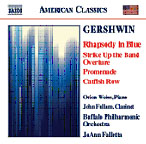 Despite
the rather short playing time, you may be tempted by the attractive
price of this album (mp3 £4.99/$6.99, flac £5.99/$7.99).
I had high expectations, too, of the performances, having enjoyed JoAnn
Falletta and her Buffalo players in an earlier recording of the Second
Rhapsody and Piano Concerto – April
2012/1 DL Roundup. Everything is in place here but at a rather lower
voltage than I remembered from that earlier encounter. You’d still realise
what a wonderful work the Rhapsody in Blue is from this performance,
but you’d be more inclined to emphasise the beauty of invention, achieved
at the expense of jazzy smoochiness. Surely I must be having an off
day – but, no, turn to Brian Reinhart’s review
and you’ll find a similar reaction. You don’t have to live on the American
side of the pond to appreciate Gershwin, but I guess it helps, so I’m
both gratified to see that we’re singing from the same hymn sheet and
sorry that we’re not more appreciative.
Despite
the rather short playing time, you may be tempted by the attractive
price of this album (mp3 £4.99/$6.99, flac £5.99/$7.99).
I had high expectations, too, of the performances, having enjoyed JoAnn
Falletta and her Buffalo players in an earlier recording of the Second
Rhapsody and Piano Concerto – April
2012/1 DL Roundup. Everything is in place here but at a rather lower
voltage than I remembered from that earlier encounter. You’d still realise
what a wonderful work the Rhapsody in Blue is from this performance,
but you’d be more inclined to emphasise the beauty of invention, achieved
at the expense of jazzy smoochiness. Surely I must be having an off
day – but, no, turn to Brian Reinhart’s review
and you’ll find a similar reaction. You don’t have to live on the American
side of the pond to appreciate Gershwin, but I guess it helps, so I’m
both gratified to see that we’re singing from the same hymn sheet and
sorry that we’re not more appreciative.
The recording is good, but with the usual proviso that while the mp3
tracks are divided, the flac comes in one dollop, which you’ll have
to divide for yourself with a program such as Medieval
Cue Splitter if you don’t like it that way. Try this from Naxos
Music Library to check out the performance, but remember that both the
320kb/s mp3 and lossless flac will sound better than the lower bit-rate
of the streamed version.
It’s not long ago that I reviewed a recording of Rhapsody in Blue
in its original jazz-band format on BIS-SACD-1940 – September
2012/2 Download Roundup. Freddy Kempf and Andrew Litton couple all
the four Gershwin concertante works on a well-filled album. That
release comes at a slightly higher price than the Naxos from classicsonline
(£7.99/$9.99) and in mp3 only from that source, but turn to BIS’s
home site, eclassical, and you’ll find both mp3 and lossless flac for
$11.09 and 24-bit flac for $17.74, complete with booklet.
Readers outside the USA, Australia and other countries where Naxos Classical
Archives are verboten will find two classic recordings of Rhapsody
in Blue from classicsonline.com: Leonard Pennario and the Hollywood
Bowl Orchestra conducted by Felix Slatkin (1956) with American in
Paris and Morton Gould and his Orchestra (1955) with the Piano Concerto.
£1.99 each in the UK or the Pennario for £0.84 from emusic.com.
Emusic.com
have the Eugene List, Eastman-Rochester SO/Howard Hanson recording
on Regis RRC1386, with American in Paris and Piano Concerto
– May
2012/1 DL Roundup – for £2.10 and a Past Classics transfer
of Leonard Bernstein in Rhapsody in Blue and Piano Concerto for
£0.84. I can’t vouch for the quality of the transfers, so you
may prefer to pay a little more for a download of one of several (at
least three) Sony releases with Bernstein in the Rhapsody, such
as the coupling with American from amazon.co.uk
for £1.78. That’s what I really call Gershwin playing of the first
order and it still sounds well, though the transfer is at slightly less
than 256kb/s.
With so much competition, old and new, I’m sorry to have to rule the
new Naxos recording out of court.
Discovery of the Month
Goffredo PETRASSI (1904-2003)
Magnificat for Soprano leggero (light soprano), Chorus, and Orchestra
(1939-40)* [30:52]
Salmo IX° (Psalm 9) in Two Parts for Chorus, String Orchestra, Brass,
Percussion, and Two Pianos (1934-36) [34:57]
Sabina Cvilak (soprano)*
Coro Teatro Regio Torino
Orchestra Teatro Regio Torino/Gianandrea Noseda – rec. 2012. DDD
Pdf booklet with texts and translations available
CHANDOS CHAN10750 [65:58] – from theclassicalshop.net
(mp3, 16– and 24-bit lossless)
[see review
by Gary Higginson and review
by Hugh Culot]
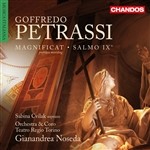 I
missed this when it was released earlier this year but I’m pleased to
have caught up with it now. Despite the clear influence of Stravinsky’s
Symphony of Psalms on the Magnificat and occasional reminders
of the 16th-century polyphonic style, there’s enough individuality about
Petrassi’s employment of the neo-classical style to make the music worthwhile.
If anything, the setting of Psalm 9, the longer work, is even more impressive
and the performance of both contributed to my enjoyment.
I
missed this when it was released earlier this year but I’m pleased to
have caught up with it now. Despite the clear influence of Stravinsky’s
Symphony of Psalms on the Magnificat and occasional reminders
of the 16th-century polyphonic style, there’s enough individuality about
Petrassi’s employment of the neo-classical style to make the music worthwhile.
If anything, the setting of Psalm 9, the longer work, is even more impressive
and the performance of both contributed to my enjoyment.
Hitherto Petrassi has been a name only to me – he’s not listed in the
last complete Penguin Guide (2010) or the last Gramophone Guide (2012)
and I couldn’t even have given you his approximate dates – but I hope
to explore his music further and that Chandos will act as vade mecum
in the process.
The recording is good in all formats – I tried the 24-bit and mp3.
Dmitri SHOSTAKOVICH (1906-1975)
Symphony No. 7 in C, Op. 60 Leningrad (1941)
Royal Liverpool Philharmonic Orchestra/Vasily Petrenko – June 2012,
DDD.
Pdf booklet included
NAXOS 8.573057 [79:15] – from classicsonline.com
(mp3 and lossless) or stream from Naxos Music Library
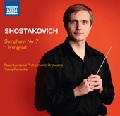 I
had considerably fewer reservations about this new recording of the
Leningrad than John Quinn – review;
if you’re looking for a budget-price version I see no reason to hesitate,
since only Rudolf Barshai on Regis RRC1074 presents a serious
challenge and the only online dealer currently advertising this on CD
is out of stock. Otherwise it’s available only in the complete Brilliant
Classics set, which is fine if you want the whole box. Perhaps the Leningrad
alone will return on the Alto label, as No.4 already has, for those
prepared to wait, but most will be more than happy with the Naxos.
I
had considerably fewer reservations about this new recording of the
Leningrad than John Quinn – review;
if you’re looking for a budget-price version I see no reason to hesitate,
since only Rudolf Barshai on Regis RRC1074 presents a serious
challenge and the only online dealer currently advertising this on CD
is out of stock. Otherwise it’s available only in the complete Brilliant
Classics set, which is fine if you want the whole box. Perhaps the Leningrad
alone will return on the Alto label, as No.4 already has, for those
prepared to wait, but most will be more than happy with the Naxos.
Petrenko’s Shostakovich has been winning plaudits and this latest addition
to the series is one of the best. The very quiet opening of the first
movement is indicative of his refusal to indulge in mere bombast. For
much of the movement the tempo is slower than most, so that when the
full power is unleashed the effect is stunning. I wouldn’t advise playing
this recording in the car – if you crank up the volume to hear the opening
over the road noise you’ll deafen yourself later. There aren’t many
longer performances of this movement: Neeme Järvi (Chandos CHAN8623)
takes just 25:30, though Valery Gergiev on Mariinsky MAR0533
(28:45) and Yevgeny Svetlanov with the Swedish Radio Symphony Orchestra
in 1993 on Daphne 1023 (29:00) just top Petrenko’s 28:29 (try
them all from Naxos Music Library). The result is that the Naxos recording
only just fits on one CD.
The recording is good in both formats, with the lossless worth £1/$1
extra and still less expensive than the CD. There’s the usual problem
if you don’t like having a flac version where all the movements are
lumped together on one file. You may find other download sites which
charge less but they don’t include the booklet.
The Soviet Experience – Volume One
String Quartets by Dmitri Shostakovich and his Contemporaries
Dmitri SHOSTAKOVICH (1906-1975)
String Quartet No. 5 in B flat, Op. 92 (1952) [31:45]
String Quartet No. 6 in G, Op. 101 (1956) [25:38]
String Quartet No. 7 in f sharp minor, Op. 108 (1960) [12:13]
String Quartet No. 8 in c minor, Op. 110 (1960) [21:56]
Nikolai MYASKOVSKY (1881-1950)
String Quartet No.13 in a minor, Op.86 (1949) [25:36]
Pacifica Quartet (Simin Ganatra (violin); Sibbi Bernhardsson (violin);
Masumi Per Rostad (viola); Brandon Vamos (cello)) – rec. 2010 and 2011.
DDD
CEDILLE RECORDS CDR 90000-127 [2 CDs: 116:05] – from eclassical.com
(mp3 and lossless) or stream from Naxos Music Library
[‘The Soviet Experience series has got off to an impressive start with
these excellent performances.’ See review
by Michael Cookson.]
Volume Two
Dmitri SHOSTAKOVICH (1906-1975)
String Quartet. No. 1 in C, Op.49 (1938) [14.43]
String Quartet. No. 2 in A, Op.68 (1944) [35.18]
String Quartet. No. 3 in F, Op.73 (1946) [31.17]
String Quartet. No. 4 in D, Op.83 (1949) [25.18]
Sergei PROKOFIEV (1891-1953)
String Quartet No. 2 in F, Op.92 (1941) [22.10]
Pacifica Quartet – rec. 2010 and 2011. DDD
CEDILLE RECORDS CDR 90000-130 [2 CDs: 75:37 + 53:40] – from eclassical.com
(mp3 and lossless) or stream from Naxos Music Library
[‘There is much to admire in these excellent, civilised and deeply considered
performances.’ See review
by Paul Corfield Godfrey.]
Volume 3
Dmitri SHOSTAKOVICH (1906-1975)
String Quartet No. 9 in E flat, Op. 117 (1964) [27:24]
String Quartet No. 10 in A flat, Op. 118 (1964) [24:52]
String Quartet No. 11 in f minor, Op. 122 (1965/66) [17:47]
String Quartet No. 12 in D flat, Op. 133 (1968) [26:11]
Mieczysław WEINBERG (1919-1996)
String Quartet No. 6 in e minor, Op. 35 (1946) [32:03]
Pacifica Quartet – rec. 2011 and 2012
CEDILLE RECORDS CDR 90000-138 [2CDs: 70:20 + 58:25] – from classicsonline.com
(mp3) or stream from Naxos Music Library
[‘The excellence of this series makes this the finest collection available
of the complete Shostakovich string quartets.’ See review
by Michael Cookson.]
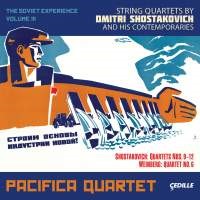 This
series of recordings, coupling Shostakovich’s String Quartets with chamber
music by his contemporaries, has received such resounding praise from
all quarters that it’s almost superfluous to add my own two-pennyworth
other than to endorse all the favourable comments and to say that I
emerged from listening with no reservations. The classicsonline.com
mp3 version of Volume 3 is very good and leads me to believe that the
same applies to their downloads of the earlier volumes. The eclassical.com
downloads of these – Volume 3 due soon? – are certainly very good in
both mp3 and lossless and their prices competitive, with mp3 and lossless
at the same price ($21.02 and $23.02 respectively).
This
series of recordings, coupling Shostakovich’s String Quartets with chamber
music by his contemporaries, has received such resounding praise from
all quarters that it’s almost superfluous to add my own two-pennyworth
other than to endorse all the favourable comments and to say that I
emerged from listening with no reservations. The classicsonline.com
mp3 version of Volume 3 is very good and leads me to believe that the
same applies to their downloads of the earlier volumes. The eclassical.com
downloads of these – Volume 3 due soon? – are certainly very good in
both mp3 and lossless and their prices competitive, with mp3 and lossless
at the same price ($21.02 and $23.02 respectively).
If the combination of Shostakovich and Weinberg appeals, the Kopelman
Quartet provide a very fine alternative account of String Quartet No.10,
coupled with Weinberg’s Piano Quintet (with Elizaveta Kopelman) on Nimbus
NI5865; something of a mixed bag with a fine recording of the
Weinberg but just missing the emotional heart of the Shostakovich –
review.
Bargain-hunters will find the Alto reissues of the eponymous Shostakovich
Quartet hard to beat, apart from the hideous artwork on the covers (ALC1112,
2012 and 2013). 7digital.com
have the complete 5-disc set for download at £7.99; otherwise
stick with the inexpensive CDs.
Discovery of the Month
Jaakko KUUSISTO (b. 1974)
Leika for symphony orchestra, Op. 24 (2010) [11:35]
Concerto for Violin and Orchestra, Op. 28 (2011-12) [30:38]
John CORIGLIANO (b. 1938)
Concerto for Violin and Orchestra, ‘The Red Violin’ (2003) [33:53]
Elina Vähälä (violin)
Lahti Symphony Orchestra/Jaakko Kuusisto – rec. April and August 2012.
DDD/DSD
Pdf booklet included
BIS BIS-SACD-2020 [77:04] – from eclassical.com
(mp3, 16– and 24-bit lossless)
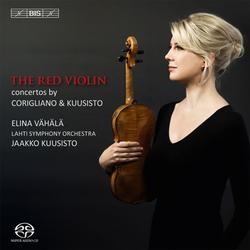 The
Kuusisto works amount to my Discovery of the Month – approachable
music from the scion of one of Finland’s most famous musical families.
Leika, an Old Norse word for play, preserved in Northern English
dialects as the verb ‘laik’, makes a good introduction to Kuusisto’s
rather tougher Violin Concerto, a powerful work which reveals the composer’s
Sibelius heritage – the composer/conductor in the notes also mentions
Pulkkis, whose music I don’t know, and Rautavaara, with whose works
we are much more familiar. If you have tried some of the Rautavaara
music that I mentioned last month, you will probably enjoy the Kuusisto.
I take the presence of the composer at the helm of the Lahti Orchestra,
whose Sibelius I revere, to be authoritative.
The
Kuusisto works amount to my Discovery of the Month – approachable
music from the scion of one of Finland’s most famous musical families.
Leika, an Old Norse word for play, preserved in Northern English
dialects as the verb ‘laik’, makes a good introduction to Kuusisto’s
rather tougher Violin Concerto, a powerful work which reveals the composer’s
Sibelius heritage – the composer/conductor in the notes also mentions
Pulkkis, whose music I don’t know, and Rautavaara, with whose works
we are much more familiar. If you have tried some of the Rautavaara
music that I mentioned last month, you will probably enjoy the Kuusisto.
I take the presence of the composer at the helm of the Lahti Orchestra,
whose Sibelius I revere, to be authoritative.
The Corigliano concerto is by now fairly familiar, with recordings by
Joshua Bell (Sony – review
– but inexplicably not currently available from most dealers in the
UK) and Michael Ludwig (Naxos – review).
The music originated as a film score, a suite from which is available
on Chandos CHSA5035 (I Musici di Montréal/Turovsky, rec.
2003, DDD/DSD [62:28] – 5-star review),
with the Second Symphony. The Symphony is pretty tough going and I can
imagine it sounding better in its original string quartet form, but
the Red Violin Suite is well worth hearing even if you also go
for the Concerto.
I’ve been sold on the Concerto since I heard Joshua Bell and Marin Alsop
give the UK premiere at the 2005 Proms – review
– so I was interested to see how my reaction to the new recording compared
with what I remember, making allowances for the hype which surrounded
that Proms performance. BIS are clearly relying on the Red Violin name
to sell this recording, since they use that as the title for the whole
album. They have a first-class soloist in Elina Vähälä
and all concerned make a strong case for the music; even if they didn’t
quite repeat the magic of that 2005 performance, they came close enough
for me to know that I shall be playing and enjoying this recording in
the future.
The recording is good in all formats. Those trying to master that most
difficult of languages, Finnish, will find material for practice in
the very helpful multi-lingual notes from the two composers.
Andrew GREEN and Tony LEWIS: Classical Chinese Music
The Wakening Lotus [1:33]
Mei Mei’s Village Dance [1:33]
Moon Flower [3:22]
The Falls of Lushan [1:41]
The Silk Road [3:05]
The Contemplation of Guanyin [1:38]
Moon Flower (String Orchestra) [1:07]
Bird Mountain Cloud Song [2:05]
Imperial Garden [2:03]
Blossom of Tan Hua [1:43]
Reverie in Xiangshan Park [2:28]
Moon Flower (Solo Cello) [1:13]
Guo Yi (Sheng, Ba-Wu), Jan Hendrickse (Xiao, Dizi, Bamboo Flute) and
Nick Cooper (Cello)
PICTURE LOCK MUSIC [23:31] – from iTunes
(mp3) [download only: no CD equivalent]
 Short
but sweet – I hope there’s more where this came from. Western arrangements
or interpretations of Chinese music can easily sound tacky or just plain
wrong, so it was with some trepidation that I approached this album,
though I admit to enjoying much ethnic music, Indian and Chinese in
particular, without knowing much about it. I need not have worried;
there’s nothing tacky about this recording and the presence of at least
one Chinese musician leads me to assume that it’s pretty authentic.
Nor does the cello sound out of place in the company of Chinese instruments.
Short
but sweet – I hope there’s more where this came from. Western arrangements
or interpretations of Chinese music can easily sound tacky or just plain
wrong, so it was with some trepidation that I approached this album,
though I admit to enjoying much ethnic music, Indian and Chinese in
particular, without knowing much about it. I need not have worried;
there’s nothing tacky about this recording and the presence of at least
one Chinese musician leads me to assume that it’s pretty authentic.
Nor does the cello sound out of place in the company of Chinese instruments.
More to the point, I imagine, for most readers, it’s very enjoyable.
Only the lack of documentation and its availability in mp3 only – though
the review samples which I received sound fine in that format – lead
me to prefer the Channel Classics recording (CCSSA80206) which
I reviewed in the November
2011/1 DL Roundup and which comes with a pdf booklet and in lossless
sound. Buy them both.
You may, like me, not have heard of picturelock.com: you can find more
about them on their website: http://picturelockmusic.com/
CANTUS
Arvo PÄRT (b.1935) Für Alina [4:00]
Steve REICH (b.1936) New York Counterpoint (version for marimba)
[11:14]
Arvo PÄRT Cantus in memoriam Benjamin Britten [6:27]
Fratres for Percussion [8:10]
Hywel DAVIES Purl Ground [11:24]
Arvo PÄRT Spiegel im Spiegel [10:25]
KUNIKO (Kuniko Kato, percussion: five octave marimba, vibraphone, crotales
and bells) – rec. November 2012. DDD/DSD
Pdf booklet included
LINN CKD432 [51:40] – from linnrecords.com
(SACD, mp3, 16– and 24-bit lossless)
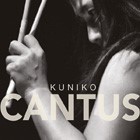 Kuniko
and Linn already had a best-selling recording with Kuniko Plays Reich
(CKD385 – review);
now they follow with a recording centred around three well-known works
by Arvo Pärt in new guise, which promises to repeat that success.
There’s more Reich here, too, a version for marimba of New York Counterpoint,
of which Kuniko gave the premiere performance, and a piece by British
composer Hywel Davies. All the arrangements have been given the seal
of approval by their composers.
Kuniko
and Linn already had a best-selling recording with Kuniko Plays Reich
(CKD385 – review);
now they follow with a recording centred around three well-known works
by Arvo Pärt in new guise, which promises to repeat that success.
There’s more Reich here, too, a version for marimba of New York Counterpoint,
of which Kuniko gave the premiere performance, and a piece by British
composer Hywel Davies. All the arrangements have been given the seal
of approval by their composers.
The title work is already familiar in a number of guises, from a simple
arrangement for violin and piano upwards. Here Kuniko accompanies herself,
thanks to multi-tracking, in an elaborate arrangement – 200 tracks at
the final count, according to the booklet – which is overwhelming and
impressive, but which doesn’t quite impart the airy and ethereal quality
which she claims to have been seeking. In compensation, the result matches
another of the adjectives which she employs to describe the work, ‘overwhelming’.
The overall effect of this album is mesmerising. The most significant
thing that I can say in reviewing it is that it sent me back to its
predecessor, courtesy of Naxos Music Library. That earlier album was
very short, so that the Reich work here could easily have been accommodated;
its successor is still rather shorter than we are accustomed to nowadays,
but that’s my only reservation and this is a recording that makes reservations
irrelevant.
[NB: Those who like this album are almost certain to enjoy the
equally mesemerising Dobrinka Tabakova's String Paths, ECM2239,
from emusic.com
– due for review in the next DL Roundup.]
Beulah Releases: July 2013
Details from eavb.co.uk here
or here
Albums from iTunes and Amazon
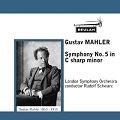 1PD74:
Gustav MAHLER Symphony No.5: London Symphony Orchestra/Rudolf Schwarz
[69:25], recorded by Everest and released on two LPs in 1959, the first
stereo recording of this work and still sounding fine in this Beulah
transfer, presumably taken from the UK release which followed some time
later. There’s an Everest CD, available on mp3 from Amazon, but at least
one user review suggests that little care has been taken over the transfer
– including mis-spelling the conductor’s name – thus making the Beulah
reissue a safer bet.
1PD74:
Gustav MAHLER Symphony No.5: London Symphony Orchestra/Rudolf Schwarz
[69:25], recorded by Everest and released on two LPs in 1959, the first
stereo recording of this work and still sounding fine in this Beulah
transfer, presumably taken from the UK release which followed some time
later. There’s an Everest CD, available on mp3 from Amazon, but at least
one user review suggests that little care has been taken over the transfer
– including mis-spelling the conductor’s name – thus making the Beulah
reissue a safer bet.
The performance may have been the first to be recorded in stereo but
it remains well worth hearing – powerful and brooding, with almost Wagnerian
climaxes, rather than lyrical. The adagietto takes a shade over
7½ minutes – one of the faster tempi on record, with Simon Rattle
taking two minutes longer and Leonard Bernstein two minutes longer still.
I know all the arguments for not taking the movement too slowly, and
Schwarz makes a good case for a fast-ish tempo, yet it’s the Bernstein
(DG) that I still choose most often for this symphony. When I bought
it, it was briefly available at mid price, but it’s still worth its
current full price, with Schwarz as a recommended second string.
The release of this and several other Beulah albums has been delayed
by technical problems at iTunes, so Beulah will be releasing this on
Beulah Extra in August 2013 as 1-5BX252.
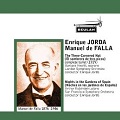 1PD73:
Manuel de FALLA: Three Cornered Hat (complete ballet); Nights in
the Gardens of Spain. Barbara Hewitt (soprano); London Symphony Orchestra/Enrique
Jorda; Arthur Rubinstein (piano); San Francisco Symphony Orchestra/Enrique
Jorda. rec. c.1957. ADD/stereo [59:50] - from amazon.co.uk
and iTunes
(both mp3)
1PD73:
Manuel de FALLA: Three Cornered Hat (complete ballet); Nights in
the Gardens of Spain. Barbara Hewitt (soprano); London Symphony Orchestra/Enrique
Jorda; Arthur Rubinstein (piano); San Francisco Symphony Orchestra/Enrique
Jorda. rec. c.1957. ADD/stereo [59:50] - from amazon.co.uk
and iTunes
(both mp3)
More Everest material: Three Cornered Hat was first released
in the UK by World Record Club, originally coupled with the Goossens
recording of Villa-Lobos’ Little Train of the Caipira, something
of a cult novelty at the time.
The recording of Nights in the Gardens of Spain is taken from
a collaboration by two artists associated with Falla and recorded for
RCA around 1957. Originally coupled with solo piano pieces, Nights
was always the chief attraction and it is so here for me; however much
I may enjoy the Hat, I love Nights. I’ve only once seen
the Alhambra and its gardens, but they remain ever present, like Wordsworth’s
daffodils in vacant or in pensive mood whenever I hear this music, especially
as well performed as this.
Three Cornered Hat is lively enough, but the LSO were not on
best form here, so you’d be better advised to look elsewhere for that
work, perhaps to Sarah Walker and a more recent LSO with Geoffrey Simon
at mid price on Chandos CHAN10232 (February
2012/2 DL Roundup), which also comes with a good performance of
Nights. Margaret Fingerhut on that recording may not be the equal
of Rubinstein but she’s not far behind. There’s also a highly recommendable
Double Decca with both works and more besides on 466128-2 – review.
So Beulah have one run-of-the-mill performance and one magical one.
Both recordings have come up sounding very well.
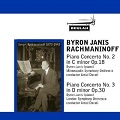 1PD80:
Sergei RACHMANINOV Piano Concertos Nos. 2 and 3: Byron Janis (piano);
Minneapolis Symphony Orchestra; London Symphony Orchestra/Antal Doráti
[68:22] – from amazon.co.uk
or iTunes
(mp3)
1PD80:
Sergei RACHMANINOV Piano Concertos Nos. 2 and 3: Byron Janis (piano);
Minneapolis Symphony Orchestra; London Symphony Orchestra/Antal Doráti
[68:22] – from amazon.co.uk
or iTunes
(mp3)
Though reissued less than a decade ago, these classic Mercury recordings
are no longer generally available on CD in the UK, so the Beulah reissue
is timely. The performances always vied for top place with those of
Richter (No.2, now on DG Originals) and Ashkenazy/Previn (Decca) and
the only reason not to place them there now is the pre-eminence among
more recent recordings of the Hyperion 2-CD set of all four concertos
(CDA67501/2, with 2 and 3 also on CDA67649, Stephen Hough;
Dallas SO/Andrew Litton). The Hyperion set is not available for download
for contractual reasons, which makes the Beulah reissue the more desirable,
perhaps as an adjunct to the Hyperion on CD or the Decca.
What’s not to like about these performances of the two best-known concertos
which combine superb technique with real feeling for the music and are
accompanied by two orchestras which worked superbly well with Doráti.
It’s not all warhorse stuff, either, as witness the slow movement of
No.2, where there’s sentiment without sentimentality. Add a recording
which has come up very well and there’s every reason to recommend this.
I haven’t heard other downloads of this album, but I can’t imagine that
they improve much, if at all, on the Beulah.
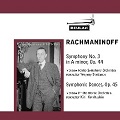 1PD81:
Sergei RACHMANINOV Symphony No.3; Symphonic Dances: Moscow Radio
Symphony Orchestra/Yevgeny Svetlanov; Moscow Philharmonic Orchestra/Kyril
Kondrashin
1PD81:
Sergei RACHMANINOV Symphony No.3; Symphonic Dances: Moscow Radio
Symphony Orchestra/Yevgeny Svetlanov; Moscow Philharmonic Orchestra/Kyril
Kondrashin
ADD/stereo [75:51] - from amazon.co.uk
or iTunes
(mp3)
As you might expect, all concerned give a fine performance on this Beulah
reissue of a recording originally issued in the UK on HMV. Though I
didn’t think it a problem, you may find the Russian brass of the period
a little fruity, which some find hard to take. The HMV LP sounded very
well – a vast improvement on Russian Melodiya or MK recordings of the
time, which usually sounded as if the surfaces were frying.
The Kondrashin recording of the Symphonic Dances featured in
its Melodiya CD incarnation on a recent Artists’ Choice of 250 top recordings.
That CD is no longer generally available in the UK and a transfer on
the Audiophile label is listed as out of stock as I write, which serves
to make the Beulah reissue all the more desirable.
There’s another Svetlanov recording of the symphony together with The
Rock and other works, with the USSRSO, on budget-price Regis RRC1353.
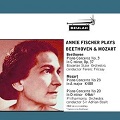 1PD83:
Ludwig van BEETHOVEN Piano Concerto No.3; Wolfgang Amadeus MOZART
Piano Concertos Nos. 20 and 23: Annie Fischer; Bavarian Radio Symphony
Orchestra/Ferenc Fricsay; Philharmonia Orchestra/Sir Adrian Boult. ADD/stereo
[91:38] Due for release from iTunes and Amazon.
1PD83:
Ludwig van BEETHOVEN Piano Concerto No.3; Wolfgang Amadeus MOZART
Piano Concertos Nos. 20 and 23: Annie Fischer; Bavarian Radio Symphony
Orchestra/Ferenc Fricsay; Philharmonia Orchestra/Sir Adrian Boult. ADD/stereo
[91:38] Due for release from iTunes and Amazon.
The two Mozart concertos were justifiably listed by Bryce Morrison among
Annie Fischer’s Key Recordings in a 2001 survey and nothing has changed
to make that less true; indeed, Nos.20-23 have just been reissued at
budget price on two CDs by Major Classics. There’s an inexpensive EMI
Red Line CD of the two Mozart works, but I don’t think the Beethoven
recording is currently available and that was one of the glories of
the DG Heliodor catalogue when it was available for 12/6, one of the
few genuine stereo LPs in that series – I know because I owned it and
it was my recording of choice for a long time, even in preference to
Wilhelm Kempff (also DG). It still comes close to the top of my list
– headed, if you push me to a choice, by Stephen Kovacevich and Colin
Davis (Philips, now on Decca Virtuoso 4784027 with Arthur Grumiaux
in the Violin Concerto).
At the time of writing iTunes had not got round to releasing this and
several other Beulah albums and though an Amazon link is listed on the
Beulah website, that was not working either when I tried; watch eavb.co.uk
for details. Their tardiness means that Beulah have released the
Beethoven on three Beulah Extra tracks, 10-12BX130, which is
ideal if you already have the EMI Red Line CD of Fischer’s Mozart or
the earlier Beulah releases of the Mozart: Concerto No.20 is already
available on Beulah Extra 1-3BX130 – see May
2011/1 DL Roundup – and No.23 on 5-7BX130 – see October
2011/1 DL Roundup. Either way the recordings have come up sounding
well and the playing time is generous – too much to burn to a CDR unless
you choose to burn an mp3 disc.
Beulah also offer Clifford Curzon in Piano Concerto No.23 on 1-3BX101,
recorded in 1945 with the National Symphony Orchestra and Boyd Neel
– not so well recorded and sounding less than authentic now, but still
well worth hearing in a transfer that mostly made me forget its age
– see January
2011 DL Roundup.
Beulah Extra
All details from eavb.co.uk
Three recordings caught my eye immediately I saw the list, Boult’s recording
of Holst, Michelangeli’s Ravel and Mackerras’s Janáček:
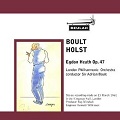 47BX12:
Gustav HOLST Egdon Heath: London Philharmonic Orchestra/Sir Adrian
Boult
47BX12:
Gustav HOLST Egdon Heath: London Philharmonic Orchestra/Sir Adrian
Boult
There could be no finer evocation of Hardy’s vision of the Heath in
Return of the Native, as envisioned by Holst, than this Boult
recording, made in stereo in 1952. It used to be available as a filler
to the Decca CD of the Solti Planets, but it’s now one of the
couplings for a rather less distinguished recording of that work on
Decca Eloquence, which makes this Beulah release an even stronger recommendation.
The recording has come up sounding at least as well as on that Decca
reissue. Strongly recommended alongside several other Beulah releases
of Boult performances of English music which you’ll find at http://www.eavb.co.uk/lp/extraboult.html.
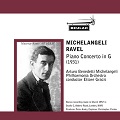 1-3BX277:
Maurice RAVEL Piano Concerto in G: Benedetto Michelangeli; Philharmonia
Orchestra/Ettore Gracis – rec. 1957. ADD/stereo [21:48]
1-3BX277:
Maurice RAVEL Piano Concerto in G: Benedetto Michelangeli; Philharmonia
Orchestra/Ettore Gracis – rec. 1957. ADD/stereo [21:48]
This recording of the Ravel Piano Concerto is rightly regarded as one
of the best available, if not the best; though recordings
by Casadesus (EMI), Queffélec (Warner Apex) Zimerman and Argerich
(both DG) have their advocates, you’ll go a long way to beat it. It’s
currently available with the Rachmaninov Piano Concerto No.4 (EMI GROC),
in the same coupling plus Haydn on the less expensive EMI Masters label
and on a budget EMI twofer of Ravel in the 20th-Century Classics series
– review
– but its separate release by Beulah for just £2.25 will appeal
to those who want it on its own. The recording sounds very well, with
little allowance needing to be made for its age.
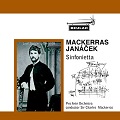 1BX278:
Leoš JANÁČEK Sinfonietta: Pro Arte Orchestra/Sir
Charles Mackerras. rec. c.1960. ADD/stereo [25:08]
1BX278:
Leoš JANÁČEK Sinfonietta: Pro Arte Orchestra/Sir
Charles Mackerras. rec. c.1960. ADD/stereo [25:08]
Mackerras went on to record the Sinfonietta again with the Vienna
Phil (Decca, various reissues including a Double Decca) and the Czech
Phil (Supraphon) but there’s a strong case for reissuing this older
version, recorded for Pye in the early 1960s, especially if you don’t
want the other works with which it’s coupled on Testament SBT1325.
I’ve seen this performance described as earthier than his later recordings;
it’s certainly got plenty of power and the sound is more than acceptable
in this transfer with nary a hint of the surface noise that bedevilled
many of the Pye LPs which I owned. Now how about the four Preludes which
were included on the original Golden Guinea LP?
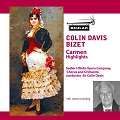 37-45BX129:
Georges BIZET Carmen (highlights in English): Patricia Johnson,
Donald Smith, Raimund Herincx, Elizabeth Robson; Sadler’s Wells Opera
Company, Chorus and Orchestra/Sir Colin Davis – rec. 1961. ADD/stereo
[51:34]
37-45BX129:
Georges BIZET Carmen (highlights in English): Patricia Johnson,
Donald Smith, Raimund Herincx, Elizabeth Robson; Sadler’s Wells Opera
Company, Chorus and Orchestra/Sir Colin Davis – rec. 1961. ADD/stereo
[51:34]
This is the latest in a series of early Colin Davis recordings which
Beulah have been reissuing. For me it’s less important than their releases
of his Mozart and Beethoven recordings but it’s still a valuable contribution
now that the Classics for Pleasure CD of these excerpts, which used
to be available, seems to have disappeared. (Amazon.co.uk had one left
at the time of writing.)
The performances are lively – much better than those of the Carl Rosa
Opera Company which introduced me to the work – and the recording has
stood the test of time well.
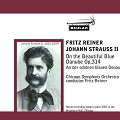 1BX176:
Johann STRAUSS II: Kaiser-Walzer (Emperor Waltz) [7:35]
1BX176:
Johann STRAUSS II: Kaiser-Walzer (Emperor Waltz) [7:35]
2BX176: Morgenblätter (Morning Papers) [8:03]
3BX176: An der schönen blauen Donau (On the beautiful blue
Danube) [8:08]
Chicago Symphony Orchestra/Fritz Reiner – rec. 1957. ADD/stereo
Reiner’s recordings of Richard Strauss and Bela Bartók remain
justly famous but he was also a distinguished Haydn conductor and here
he proves that he could turn his hand to the lighter music of that other
Strauss, Johann the younger; he also recorded Fledermaus, now
available from Pristine Audio. He even manages to make the Chicago players
sound passably like the Vienna Phil – listen to the lilt in Morgenblätter
and you might think Willi Boskovsky was at the helm – and the recordings
have come up well.
There’s more Reiner/Strauss out there, but little or none of it currently
available in the UK. The various reissues on CD and SACD are no longer
listed, so I hope that Beulah will give us some more.
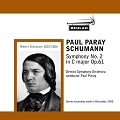 1-4BX279:
Robert SCHUMANN Symphony No.2: Detroit Symphony Orchestra/Paul Paray
– rec.1955. ADD/stereo [33:56]
1-4BX279:
Robert SCHUMANN Symphony No.2: Detroit Symphony Orchestra/Paul Paray
– rec.1955. ADD/stereo [33:56]
5BX279: Robert SCHUMANN Manfred Overture: Detroit Symphony Orchestra/Paul
Paray – rec.1958. ADD/stereo [10:37]
Between 1954 and 1958 Paul Paray recorded all four Schumann symphonies
– the remaining works, Nos. 1 and 4 are due for reissue on Beulah 1PD68
from iTunes and amazon.co.uk.
With the 2-CD Mercury reissue no longer available in the UK, the Beulah
reissues are welcome, though competition in these works is strong, even
at budget and mid-price. My own favourite remains the EMI Sawallisch,
with Kubelík as runner-up (DG Originals and Sony), both inexpensively
available, and there would be a strong case for someone (Beulah?) to
reissue the Decca recording of Nos. 1 and 4 from the LSO and Josef Krips
– not a conductor whose reputation has endured, but his version of No.1
in particular, once available on a 10" LP, is stunning.
The Manfred Overture first appeared in tandem with the First
Symphony and the Fourth Symphony with music by Liszt; the former received
something of a pasting from Trevor Harvey and the latter came off only
slightly better. With its inspiration in Byron, this is archetypally
Romantic music and it needs a stronger performance.
The Second Symphony, too, was panned as superficial by Harold C Schonberg
when the American LP first appeared in 1956 so with firm favourites
already in mind, as above, I started with low expectations to listen
to the First, the Spring Symphony. Spring is certainly bustin’
out all over in the Krips and Sawallisch recordings but it’s rather
delayed in the Paray performance and even when it gets going I much
prefer those rival recordings.
The Second Symphony, too, often sounds lumpish by comparison with Sawallisch
or Kubelík, the latter available on an inexpensive DG Originals
set of all the symphonies as a download from amazon.co.uk
for £5.49 (lossless flac from deutschegrammophon.com).
Though matters improve as the symphony progresses, this is not a version
that I would recommend. Despite Beulah’s efforts, the sound is acceptable
at best. For Thomas Dausgaard’s smaller-scale recordings of the symphonies
on BIS, see April
2010 DL Roundup; only about the First did I have some reservations.
In addition to the classicsonline.com links in that Roundup, these recordings
are available in lossless sound for the same price as mp3 from eclassical.com.
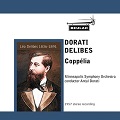 2-4BX14:
Léo DELIBES Coppélia (complete) Minneapolis
Symphony Orchestra/Antal Doráti – rec. 1957. ADD/stereo [85:21]
2-4BX14:
Léo DELIBES Coppélia (complete) Minneapolis
Symphony Orchestra/Antal Doráti – rec. 1957. ADD/stereo [85:21]
Another classic recording brought to life by Beulah colourfully and
at an attractive price – £5 for the whole ballet, which makes
it competitive with the Ansermet recording from the same period (Decca
Eloquence) and the later Bonynge (Decca Ballet Edition), each at around
£11 on two CDs. In fact, you could buy the Ansermet in the Naxos
Classical Archives transfer as well, unless you live in the USA, Australia,
or another country where it’s not available for copyright reasons, and
still have change from £10. I find it hard to choose between the
two – even the overall timings are almost identical; despite Doráti’s
reputation for fast tempi there’s nothing over the top here, though
you may think Ansermet just a shade more affectionate.
The original LPs were rather strident and that’s been very largely tamed;
the sound is slightly drier than modern recordings, but very acceptable.
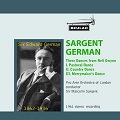 29BX13:
Edward GERMAN Nell Gwyn – Three Dances: Pro Arte Orchestra/Sir
Malcolm Sargent – rec. 1961. ADD/stereo [9:18]
29BX13:
Edward GERMAN Nell Gwyn – Three Dances: Pro Arte Orchestra/Sir
Malcolm Sargent – rec. 1961. ADD/stereo [9:18]
Sir Malcom Sargent made a number of popular recordings with the Pro
Arte Orchestra, including the Sullivan Overtures from the same LP, which
Beulah will be reissuing in August 2013 on 30-33BX13. When first
released on the HMV Concert Classics label, the stereo LP cost 5/– (£0.25,
but worth at least £8 in today’s values) more than the mono. Autre
temps … The music may be well and truly out of fashion now
– it even was in 1962 – but in such idiomatic performances it remains
enjoyable.
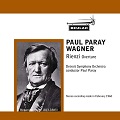 6BX279:
Richard WAGNER: Rienzi Overture Detroit Symphony Orchestra/Paul
Paray – rec. 1960. ADD/stereo [10:54]
6BX279:
Richard WAGNER: Rienzi Overture Detroit Symphony Orchestra/Paul
Paray – rec. 1960. ADD/stereo [10:54]
Though I’d call myself a reasonably committed Wagnerite, the overture
is all that I’ve ever heard of Rienzi. It receives a fine, dramatic
performance here – much the best of Beulah’s Paray offerings this month
– and the recording hardly sounds its age. There’s more where this came
from – a collection of Wagner overtures and other orchestral music which
first appeared in the UK in 1961 on AMS16095 – and I hope that
we shall have the rest in due course.
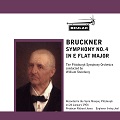 1-4BX280:
Anton BRUCKNER Symphony No.4 (Romantic) Pittsburgh Symphony
Orchestra/William Steinberg – rec.1954. ADD/stereo [55:15]
1-4BX280:
Anton BRUCKNER Symphony No.4 (Romantic) Pittsburgh Symphony
Orchestra/William Steinberg – rec.1954. ADD/stereo [55:15]
The EMI (ex-Capitol) separate CD, which was once available is now to
be found only in a 20-CD box. That version gave the recording date as
1956 and described the sound as binaural, so I’m not sure if we’re dealing
with like for like, though there is some stereo information on this
recording and I hardly imagine that Capitol would have recorded the
same performance twice in a space of two years when Bruckner recordings,
even of the Romantic Symphony, were thin on the ground.
Steinberg was an accomplished Brucknerian and though tempi are fairly
fast – when most LPs of the Romantic ran to three sides, this fitted
on two – I didn’t think it too hurried. I’m not sure which edition was
used, so it’s difficult to compare timings, but the slow movement and
finale are a couple of minutes shorter than usual. Eugen Jochum from
the same vintage (1955, Naxos Classical Archives) takes 65 minutes overall
and my favourite version from Günter Wand on RCA runs to 69 minutes.
(Bargain of the Month: March
2010 DL Roundup.) The recording is good for its age, though with
moments when the sound of the brass is slightly wavery. If you’d ever
heard the only other recording from that period to fit the work on one
LP, a reissue of a dim Vox recording made by Klemperer which I owned
c.1960, you’d think the Beulah reissue of the Steinberg aural bliss.











